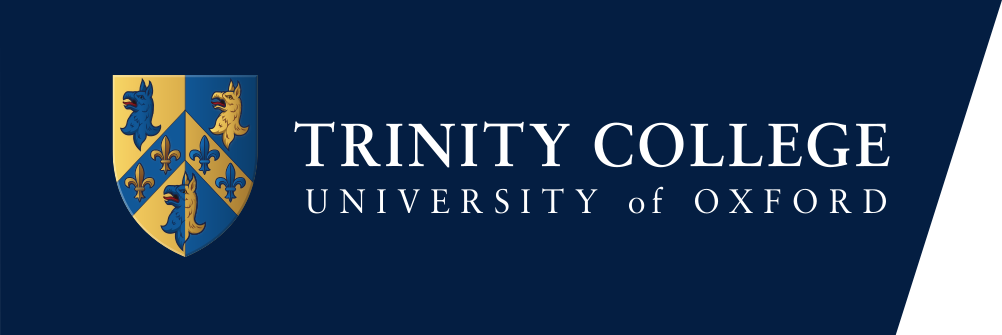
Make a Gift
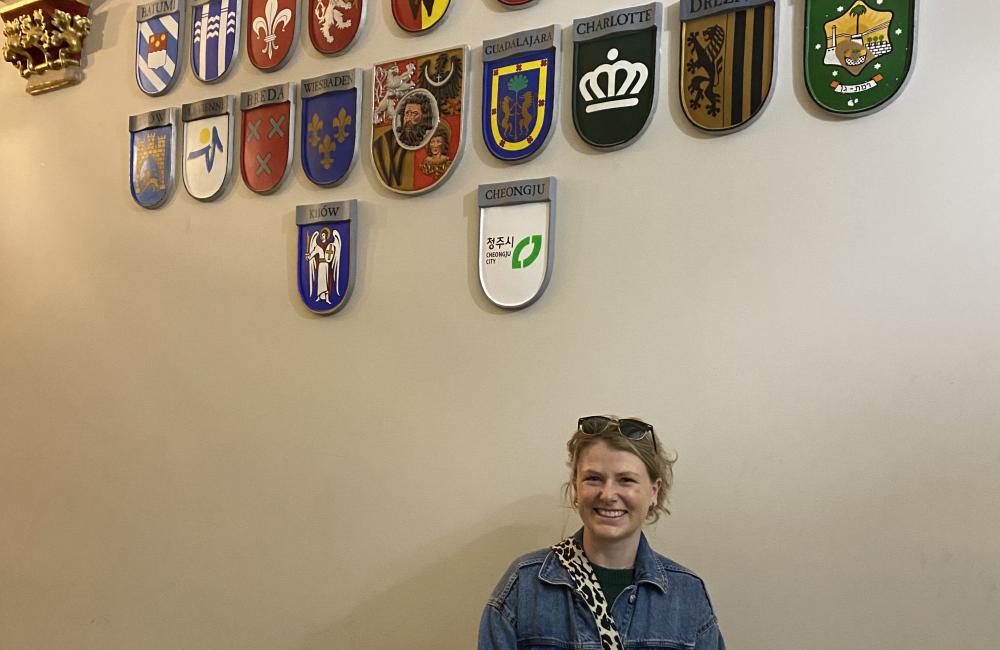

Travel Grants Open for Applications
Trinity’s generous travel scholarships are open for applications and are offered to students of both the college and wider University.
The Peter Kirk Travel Fund will provide scholarships for students wishing to travel within Europe to undertake independent research into any aspect of modern European culture. The James and George Whitehead Travel Grant funds final-year Trinity undergraduates from the UK to travel abroad.
Both grants are subject to eligibility criteria and will close for application on 9 February.
The Peter Kirk Travel Fund makes scholarships available to students, aged 17 to 30, currently studying at the University of Oxford at undergraduate or graduate level. Each scholarship is usually worth up to £2,000; there will be up to 6 awards given for travel in 2024. The Scholarships are funded by a generous benefaction from the family of the late Sir Peter Kirk MP.
Trinity postgraduate Ishbel Henderson travelled to Leiden, Bonn, Padua and Wroclaw on a Peter Kirk scholarship in 2023, to undertake research into the purpose and benefits of city twinning in the 21st century. Through interviews with city administrators in European cities twinned with Oxford, she looked at the original purpose of the twinning scheme, successes and challenges, and has worked to raise engagement among younger populations in Oxford’s twinned cities via online and social media activity. She concludes: ‘Having met with various people and observed the successful activities, and the potential for shared expertise, I think the conclusion is that the returns and benefits from twinning are entirely reciprocal relationships and that the more investment in time, money, or effort has the most effective connection and subsequent benefit… Overall, twinning is a net positive force that should continue and could drastically improve real people’s lives.’
The James and George Whitehead Travel Grant is open to Trinity students in the final year of their undergraduate course, and of UK nationality. Students reading four-year degrees are eligible to apply in their fourth year. The grant is restricted to students who are anticipating a career in a business or commercial sector in the UK, and any trip that will broaden an applicant’s experience of different cultures and societies is eligible for consideration. The award holder is required to begin the travel within three months of completing Finals. The total award offered is £2,000, which may be divided between several students, depending on the applications received. It is not necessarily intended that the grant will cover all the costs involved.
Henry Cowell travelled to Japan on a Whitehead Travel Grant in summer 2023; he participated in an exchange between Oxford University Yacht Club and Doshisha University Yacht club in Kyoto, Japan. Over the course of a week he took part in cultural activities including learning kanji calligraphy, touring the city of Kyoto – including an evening of karaoke singing – and sailing on Japanese racing snipes and in a regatta followed by a bamboo noodle dinner. He says of the experience: ‘This wonderful experience was only made possible due to the generosity of the Whitehead family, and I would like to thank both them and Trinity College for facilitating a once in a lifetime trip with so many unique experiences that I will never forget.’
Full details of the scholarship are on the college website Travel Grants page ; applications open on 8 January 2024 and close on Friday 9 February.
Trinity College
Latest news.
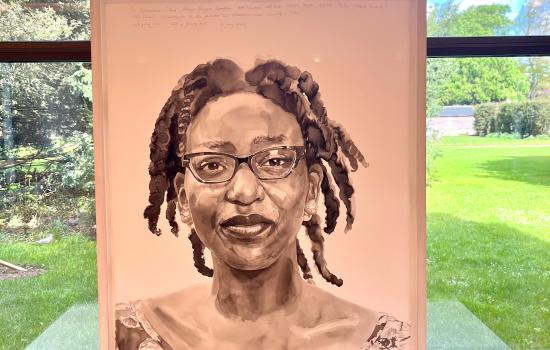
Celebrating Collaboration and Resilience: The PRINCIPLE PANORAMIC Art Exhibition
Trinity College has hosted a symposium and art exhibition celebrating the collaboration behind Oxford’s groundbreaking COVID-19 trials led by Professorial Fellow Christopher Butler.
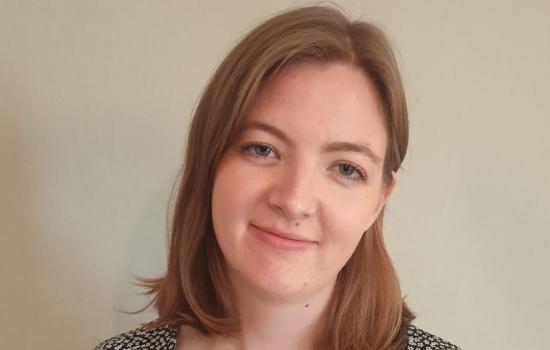
Comic Objectification Paper Wins Feminist Aesthetics Research Prize for Zoe Walker
Trinity Career Development Fellow Zoe Walker has been announced as the winner of the inaugural Feminist Aesthetics Research Prize.
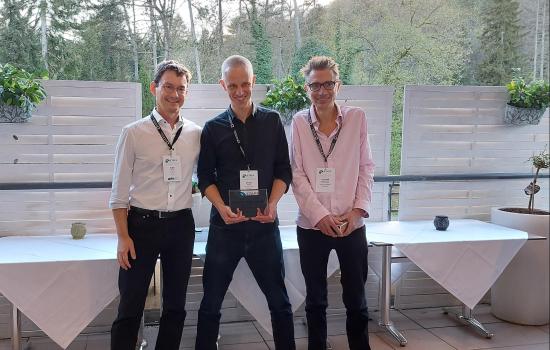
PRISM Creators Win the ETAPS Test-of-Time Tool Award 2024
Trinity Professorial Fellow Marta Kwiatkowska and Tutorial Fellow Dave Parker have been awarded the 2024 ETAPS Test-of-Time Tool Award for their tool PRISM.
Funding Sources and Travel Grants
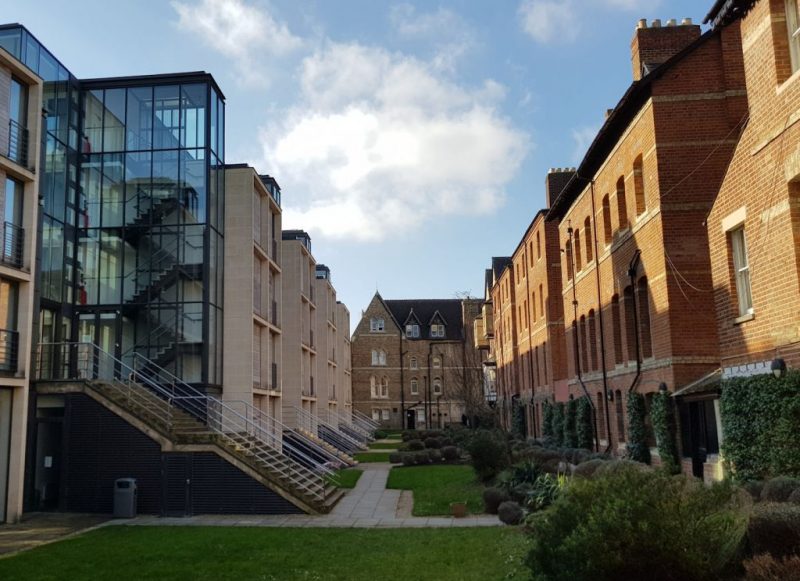
JCR Research and Travel Grants
Most undergraduates and post-graduates are eligible for travel grants (post-graduates should apply to the Tutor for Graduates). Preference will be given to third year undergraduates for travel at Easter, and second year undergraduates for travel during the summer vacation.
Deadlines for application are:
- 5th week of Hilary Term for the Easter Vacation;
- 5th week of Trinity Term for the Long Vacation.
Procedure for applying
- Complete application form (available online or from outside Principal’s Office)
- Hand the form to your personal tutor who will complete the reference section and send it to the Principal.
If you apply for a grant from an outside body (College Secretary’s Noticeboard) you must indicate this on your application.
PLEASE MAKE SURE YOUR APPLICATION IS COMPLETED AND RETURNED TO THE PRINCIPAL’S SECRETARY BEFORE THE DEADLINE
General Information
Most travel funds are tied to certain conditions; confined to named subjects, certain destinations or to whether the travel is of academic relevance to your course. Selection is based on the following:
- Your Personal tutor’s recommendation, your academic performance and a clear battels account.
- Academic relevance to your course may affect the size of the grant received.
- Whether you have received an award in the past.
Further information about the various travel funds is available on the table outside the Principal’s Office.
The Ruth Deech Award for Further Legal Study 2024
The Ruth Deech Award for Further Legal Study seeks to provide some financial assistance to promising students who wish to undertake further academic or vocational legal study.
Students must intend to commence these studies in the year 2024. This award is available for students who will be completing their legal studies (FHS/BCL/MJur/MLF/DPhil/MPhil) at St Anne’s College in 2024, or who have graduated in the past 3 years.
Awards will make a contribution towards the costs of further study or experience.
Please find more details and application procedures here . The application deadline is 5pm on Monday 22nd April 2024 (Week 1 Trinity term).
Vacation Laboratory Studentships 2024
St Anne’s also offers Vacation Laboratory Studentships. These are designed to help with the living costs of St Anne’s undergraduate students undertaking research in laboratories over the summer vacation (the placements themselves must already be funded, the studentships are there to fund extra costs only).
There are 6 studentships of up to £240 per week on offer for up to 6 weeks.
Please see here for further details.
Other sources of funding for current students
For a list of funding sources available to current students, as well as eligibility, application and deadline details, please see HERE .
The University’s Undergraduate Fees and Funding page can be found here.
2022-23 Travel Grant Application Form
Grants, prizes & scholarships
- Share on LinkedIn
- Share on Facebook
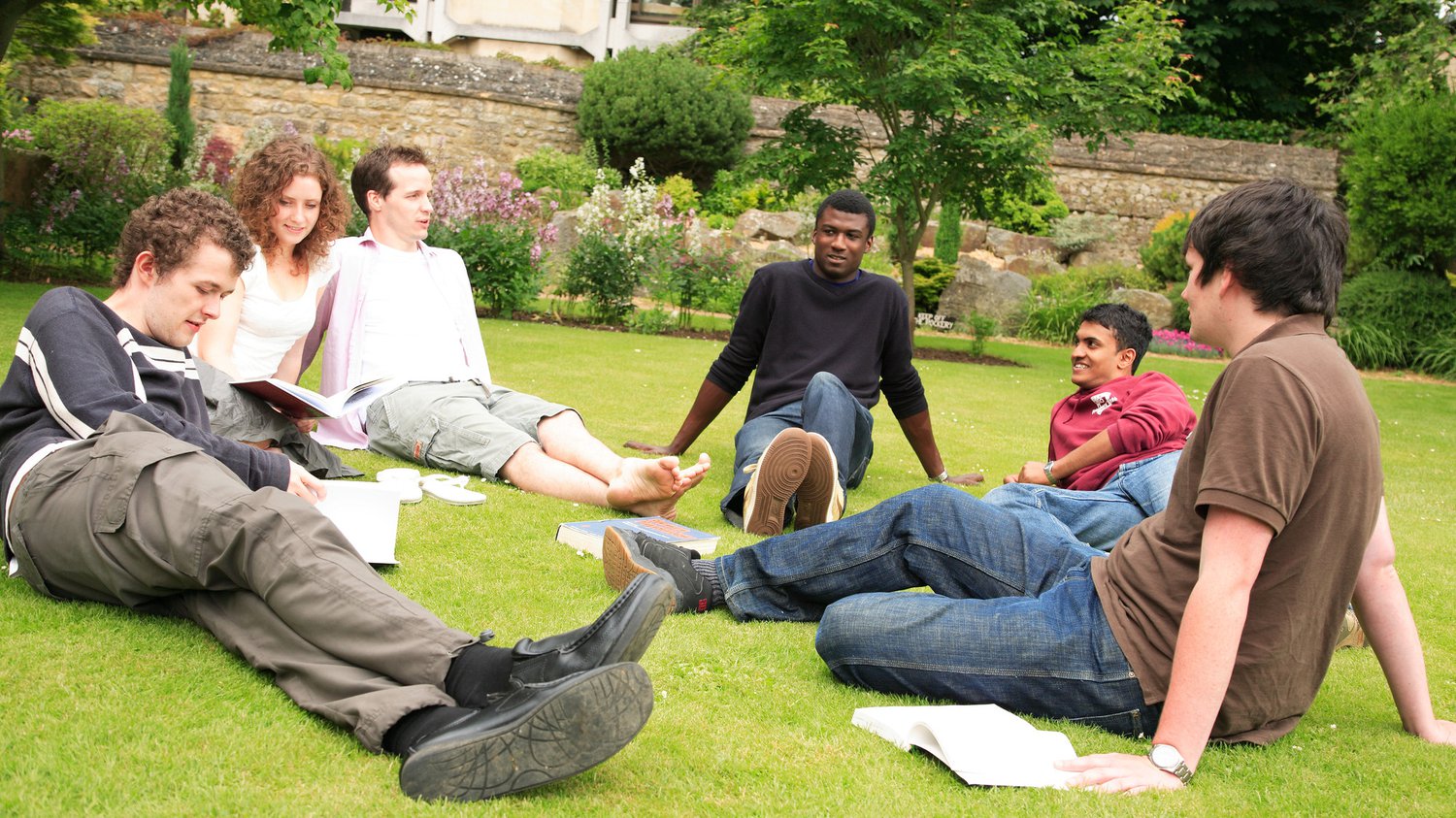
In order to watch this video you will need to accept advertising cookies.
Graduate funding
There is comprehensive information on financial support and grants available for current graduate students under Financial support for graduates . Information for prospective graduate students is available on the Graduate finance page.
Undergraduate funding
For information on course fees and the funding available to undergraduates see https://www.ox.ac.uk/admissions/undergraduate/fees-and-funding?wssl=1
Major funding
The BIG – St John’s Undergraduate Scholarship in Mathematics for Overseas Students St John’s College in partnership with Global Talent Lab and its Backing Invisible Geniuses (BIG) program wishes to support undergraduates of outstanding academic potential who are in financial need. The scholarship is restricted to candidates in Mathematics and its joint degrees who have earned a medal at the International Mathematical Olympiad, the European Girls’ Mathematical Olympiad, or another major international science Olympiad, and whose fee status is OVERSEAS. For further details about Fees and Funding, please go to:
Ugrad Fees & Funding 2024/5
The scholarship may cover both University and College fees, and a living cost grant. The award(s) may be partial or whole depending on the assessed financial status of the applicant(s).
The scholarship holder(s) will be invited to join the cohort of BIG scholars at the Global Talent Lab and participate in the events organised by the GTL. They may also benefit from an allowance to support travel and academic enrichment.
All applicants must apply to the University and be offered a place for the 2024 undergraduate intake by St John’s College before their application can be considered. To apply, follow the guidelines and complete the BIG-SJC Undergraduate Scholarship form [ PDF version ] by 12 Noon GMT 7th February 2024. Oxford Bursaries Oxford Bursaries are available for Home students from lower income households. This scheme provides generous non-repayable bursaries for full-time students paying fees at the Home rate with qualifying household incomes. The type and level of support available varies depending on where you are from and when you started your course. If you are entitled to an award you will be sent a notification letter by Student Funding Services.
Crankstart Scholarships Home students from the lowest household income brackets will be offered a Crankstart Scholarships which provides financial support as well as additional opportunities including access to funded internships and social activities. There is no need to apply and selected new first-year students will be offered a Scholarship from mid-September each year.
Oxford Assistance Fund (includes PGCE & Medical Students in years 4-6) Financial assistance is available for Home students who face difficulty in meeting their living costs. It cannot be used to help meet tuition fees. Students will be assumed to be in receipt of their maximum student loan entitlement. To find out more, please visit the Oxford Assistance Fund page.
Leverhulme Trade Charities Trust Bursaries For UK undergraduates who are closely related to a commercial traveller, chemist or grocer. Full eligibility details and application forms are available on the Leverhulme Trade Charities Trust website.
Scholarship and Funding Search Tool
For further information about the range of scholarships and funding provided by the University, please go to the funding search tool at:
Fees and Funding Search
Smaller grants and prizes
Academic Grants
Students may apply for help towards the purchase of approved books and materials of an academic nature as below:
- Books and academic materials
- portable or hand-held computing devices
- desktop computers
- computer software and peripherals
- memory or hard-disk upgrades
- computer repairs
- personal printers
- USB ethernet adapters
- Tickets for performances/exhibitions
Travel, phone or data services, printer ink or paper, maintenance or insurance contracts for items purchased are not eligible for reimbursement.
Undergraduates may claim a maximum of £398 and Graduates a maximum of £522.
Purchase of a single item which costs in excess of the annual limit may be permitted, with prior approval from your Tutor/Supervisor/College Advisor. The cost will then be amortised annually over the remaining years for which you are eligible for the academic grant. A copy of the receipt for this item must be retained and submitted with your first claim.
Applications can be made from Week 0 of Michaelmas Term to Week 8 of Trinity Term and are limited to three in any one year, so please collate purchases and receipts rather than sending them in individually. Apply on the form via this link .
Vacation Residence and Grants
Undergraduate students wishing to remain in residence after the end of term, or return before the beginning of term, or to stay in College during part of a vacation, may apply for vacation residence. Additional nights are changed at the nightly rate for the room grade.
In addition to vacation residence, Undergraduate students may apply on the same application form for vacation residence grant towards the cost of remaining in residence outside of term time.
Undergraduate students will receive the following grant days:
Year 1: 14 grant days
Year 2: 14 grant days
Year 3: 40 grant days
Year 4: 40 grant days
This grant is only awarded for residence for academic purposes. It is not available for non-academic events or to support overseas students who do not return home during the vacations. An Extended Licence is available for overseas students – see Extended Licence section below. Unused days from a year may not be carried forward.
Details about the Vacation Residence request process can be found on the college intranet
Extended Licence and Grant
An ‘Extended Licence’ (from 0th week Michaelmas to 8th week Trinity) is available to support students for whom the process of leaving for the shorter vacation periods at Christmas and Easter can be disproportionally difficult - and to enable them to stay in college accommodation (although you may be required to move rooms) during these periods, without the need to apply for vacation residence.
Applications for the Extended Licence is only available to:
- International students (those who have ‘overseas’ or ‘EU’ fee status or students with home fee status but resident overseas)
- Students with disabilities that would make it difficult for them to pack their rooms and depart for the shorter vacation periods
Students making an accommodation request based on disability-related grounds should request an extended licence as part of their application for accommodation based on disability-related grounds. The extended licence for applications on disability-related grounds will only apply to students who are approved through this process and who have a Student Support Plan in place recommending they stay during the vacation periods.
As part of the Extended Licence, all vacation nights (nights outside of official term dates) will receive a grant allowing a 50% discount of the nightly room rate. By accepting an Extended Licence you are agreeing to the full period of the licence (from 0th week Michaelmas to 8th week Trinity) and to be charged for all nights within the licence period regardless of whether you chose to depart college accommodation for any dates within the vacations, and cannot revert to a standard accommodation licence afterwards. As the Extended Licence is discounted and includes the Christmas and Easter Vacation, those on this licence will not also be eligible for Vacation Residence Grant Days. Additional vacation residence days at the end of Trinity term, at the end of the Extended Licence, should be requested via the Intranet ‘Vac Res Booking system. The licence gives provision to remain in college accommodation, however, you may be asked to move room during the vacation periods.
Hardship Grants (University) These grants are for students who experience financial hardship as a result of unforeseen circumstances. Please visit the University's Hardship page for further information.
Hardship Grants (College)
These grants are for financial hardship as a result of unforeseen circumstances. Download a Financial Assistance Application Form , to be submitted to the Senior Dean or Fellow for Welfare, together with copies of your bank account statements for the last three months. Students who are concerned about financial hardship may wish to discuss their circumstances with the Finance Manager before submitting a form.
Undergraduate Special Grants For special academic purposes such as travel to undertake research in archives, in support of work directly relevant to your course, e.g. field trips/compulsory activities, attendance at meetings, summer schools, conferences, for academic project work to be carried out in Oxford, travel to undertake voluntary work.
Notes of guidance for undergraduates can be seen here . Applications should be made online at https://forms.office.com/e/Z4vgN6gQCy . If you are applying for assistance towards the cost of accommodation in College during vacation periods, applications should be made through https://forms.office.com/e/zppMSPRstd .
Successful applicants will be required to produce a report on not only the basic facts of their trip, but also what they’ve gained towards furthering their course studies.
Applications for Special Grants must be made via the online Special Grants form (link above) by noon on Thursday of 4th Week in Michaelmas Term and noon on Thursdays of -1st Week and 4th Week in Hilary and Trinity Terms.
Expanding Horizons Programme Grants
In Hilary and Trinity Terms, thanks to the generosity of an alumnus, we offer the Expanding Horizons Programme (EHP) . Notes of guidance can be seen here . The purpose of the EHP is to enable the College’s students to enlarge their intellectual and/or imaginative horizons through engaging with ideas and/or disciplines beyond their subject. It is envisaged that the majority of activities for which applications are supported will take place in the Easter and/or Long Vacations. Where we receive more applications than can be funded, we will support those which seem best to demonstrate real value to the recipient of the proposed work.
Successful applicants are required to submit all receipts for expenses covered by the grant and a report (approximately 1,000 words) on what they have learnt through their activities and the extent to which they consider how much their own intellectual horizons to have been expanded by their trip, referring back to their original application.
Applications for the Expanding Horizons Programme must be made via the online form ( https://forms.office.com/e/EAXt3GpuSR ) by noon on Thursdays of -1st Week and 4th Week in Hilary and Trinity Terms.
Blues Squad Grants The College pays grants of up to £250 per year to cover the costs incurred by students through membership of university representative team squads. Claims are made on a Blues Grant application form which after completion should be accompanied by receipts, countersigned by an official of the relevant university sports club, and submitted to the Sports Officer .
Mapleton-Bree Prize for work in the Creative Arts The College will offer a prize of up to £300, which may be shared if deemed appropriate by the judges, for original work in any branch of creative art (drawing, painting, sculpture, poetry, music, photography, etc.). If there is no entry of adequate standard there will be no award. All junior members, whether graduates or undergraduates, may compete and the entries will be judged by a Committee consisting of both junior members and senior members of the College. Competitors should send in one example of work done during the previous twelve months. Entries are considered in Trinity Term each year and should be sent to the President's PA not later than the end of the third week of Trinity Term.
Alister Sutherland Award This award is for a journey in the high mountains. Applications are invited for this award which has been instituted as a result of a generous gift from Dr Gillian Sutherland in memory of Alister Sutherland, distinguished economist, who read Politics, Philosophy and Economics at St John's. The award, up to £600, will be made annually to an undergraduate or graduate member of St John's who presents the most imaginative and best planned proposal for a journey in the high mountains, preferably (but not necessarily) in mountainous regions where the summits exceed 3000 metres in height. The purpose is to encourage the discovery and the enjoyment of the high mountains. Applications are considered in Hilary Term each year and should be sent to the President's PA not later than the end of the third week of Hilary Term.
Hans Michael Caspari UN Travel Grant This grant is for studies in the field of International Relations. It was established through the generous gift of the late Professor Sir Fritz Caspari and his wife, in memory of their eldest son Hans Michael, who like his father and brother, attended St John's. The award, of up to £700, will be made annually to an undergraduate or graduate member of St John's to assist them to travel to Bonn, New York, Geneva, Vienna or one of the other seats of the UN or more generally to the seats of other international organisations, in order to further their study of International Relations. Applications, in the form of a letter of no more than two pages with a separate CV and marks if available, should be sent to the Academic Office by Friday of 1st Week of Hilary Term and will be awarded in time for travel during the Easter or Long Vacations.
Burke Knapp Travel Grant This scholarship is for students in pursuit of development issues in the Third World/Emerging Economies. Applications are invited for this travel fund, which has been established through the generous gift of the late Mr Joseph Burke Knapp, Honorary Fellow of St John's College. The award, of up to £500, will be made annually to an undergraduate or graduate member of St John's to cover travel and related expenses in pursuit of development issues in the Third World/Emerging Economies. Applications should be made to the Academic Office by Friday of 1st Week of Hilary Term and will be awarded in time for travel during the Easter or Long Vacations.
Music Bursaries
The College intends to offer four Music Bursaries for Junior Members of St John’s College. Each Bursary will be tenable for one academic year and will provide up to £120 per term towards the cost of music lessons. (Proof of the lessons to be confirmed by music tutors.) In addition to the four Bursaries, a John Heath Music Scholarship of £400 is available to help finance lessons for a gifted instrumentalist.
Selection will be by audition on Friday 12 November in Week 5 of Michaelmas Term. All resident Junior Members (other than those eligible for, or already receiving, other College or Faculty of Music financial support for music lessons) are eligible to apply. Applications should be made by email to the President’s PA by Friday 5 November . ([email protected]). They should include:
- details of the instrument or voice;
- proposed piece for audition;
- a copy of the music score.
Candidates will be expected to play one piece, or an excerpt of a piece, lasting no more than five minutes. Those who require an accompanist should provide their own.
Scholarships
Choral Scholarships Each year, up to eight Choral Scholars are elected after auditions in Hilary term. Choral awards are open to women and men who are matriculated members of St John’s reading any subject, both graduates and undergraduates, who are able to demonstrate musical excellence and willingness to play a responsible role in the choir, both in terms of administration and encouragement of others.
Choral scholars are expected to have good sight-reading, the ability to lead their section and competence to sing solos when required. The responsibilities include attendance at all services sung by the choir and the preceding rehearsals (a commitment of around six hours per week) and charge of the chapel music library.
In return, the college offers an award of £300 per annum, plus up to £360 per annum for singing lessons to its choral scholars, plus a modest fee per service, in addition to the opportunity to sing at notable college feasts, to tour and to give concerts with the choir.
Our website uses cookies
We use essential and non-essential cookies that improve the functionality and experience of the website.
For more information, see our cookies policy.
Necessary cookies
Necessary cookies ensure the smooth running of the website, including core functionality and security. The website cannot function properly without these cookies.
Analytics cookies
Analytical cookies are used to determine how visitors are using a website, enabling us to enhance performance and functionality of the website. These are non-essential cookies but are not used for advertising purposes.
Advertising cookies
Advertising cookies help us monitor the effectiveness of our campaigns as well as enabling advertising to be tailored to you through retargeting advertising services. This means there is the possibility of you seeing more adverts from us on other websites that you visit.
- Save settings
Africa-Oxford travel grants
AfOx is a cross-University platform to support the development of equitable collaborations in research and teaching between staff at African institutions and collaborators in Oxford.
AfOx travel grants support visits between potential collaborators in African institutions and their colleagues in Oxford, with a view to developing new collaborations around research or teaching.
Applications are open to any discipline within the University.
More information:
AfOx WEBSITE
Internal funding
Popular links
- Vision Zero – cycle and scooter safety
- Discount bus travel
- How to access bike repair services
- Discounted bike locks and lights
- University Parking Permits
- Season Ticket Loan
: +44 (0) 1865 6 14814

Get cycling
We encourage all our staff to make the ultimate sustainable travel choice – walking or cycling to work and in and around Oxford

Green Travel Fund
Our aim is to make it second nature to choose those modes of transports that reduce environmental impact, congestion and air pollution.
The University is committed to helping our staff choose ways of travelling on a day-to-day basis.
We encourage you to:
- Cycle or walk where possible
- Consider using the Park and Ride or Park and Stride facilities
- If you cannot walk or ride, use public transport
- If there is no alternative to driving, review the University Parking Permits for staff returning to on-site working.
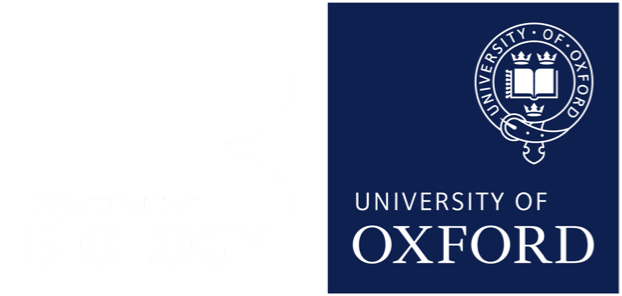
Supporting undergraduate field study in Biology
Providing students with the best possible education is at the centre of our mission at departmental and University level. Field work is an integral part of this education, equipping students with the necessary skills and cutting-edge technologies for studying global climate change and conservation biology.
Ecological field courses in Borneo, Tenerife and Tanzania allow students to develop skills such as camera trapping, sampling, or surveying. But they do require a financial contribution from students, on top of the usual costs of going to university.
As we strive to diversify our student population, and encourage more students from less affluent backgrounds to study Biology at Oxford, we must ensure that participating in field study is not a financial burden.
By making a gift to the Travel Bursary Fund, you can ensure the opportunities offered by an Oxford Biology degree are open to everyone. In turn, our students will be equipped with the best tools and training possible to go on to address global challenges.
- Donate to Plant Sciences
- Donate to Zoology
Find other funds to support
Travel Grants in 2022
Home » Study » Awards » Travel Grants in 2022
In 2022 the College awarded 29 Kellogg College Travel Grant Awards to its DPhil and MPhil students to help assist with travel, registration and attendance costs when presenting their work at conferences, or to help meet the travel expenses of research trips.
A few of these students share with us how they benefitted from their grant.
Joel Fundaun (DPhil Clinical Neurosciences)
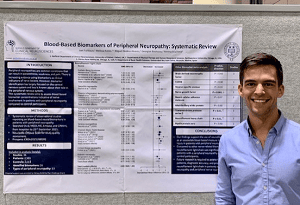
The Kellogg Travel Grant was essential in allowing me to present at the International Association for the Study of Pain Congress 2022. This is the world’s largest gathering of clinicians and researchers interested in advancing pain research.
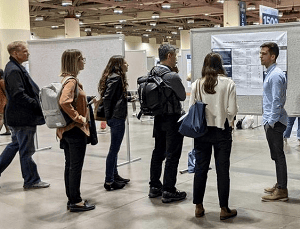
I presented my recent research regarding blood-based biomarkers of peripheral neuropathy. My findings synthesize a number of exciting biomarkers that are highly relevant to both clinicians and researchers studying an important painful condition. I am very grateful to Kellogg for the opportunity to attend this conference and present my latest research.
Simon Finney (DPhil in Mathematics)
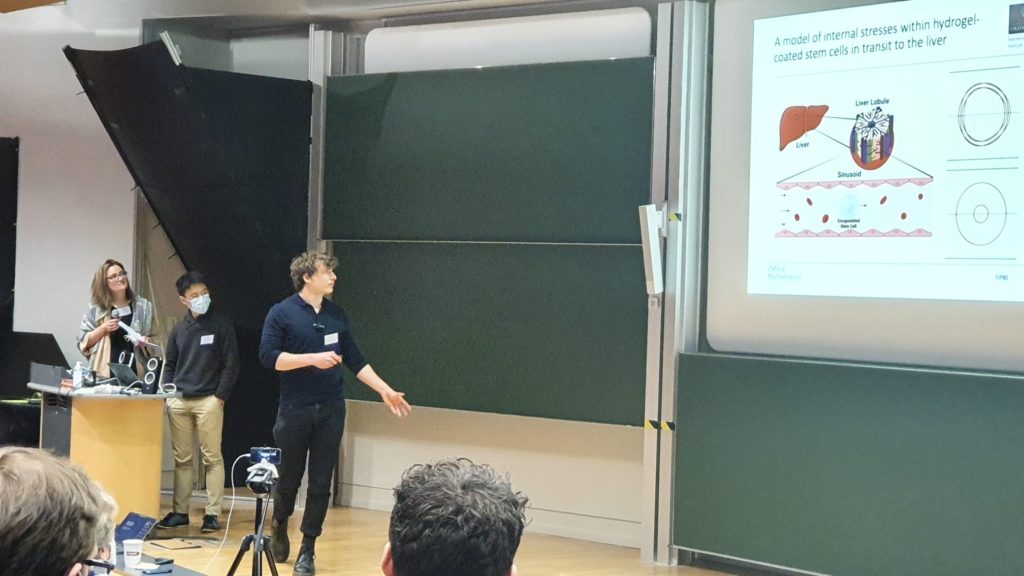
In March and April of 2022, Simon Finney attended two conferences: TJP80, a two-day conference organised by the former students/postdocs and colleagues of Prof Tim Pedley FRS, addressing recent research breakthroughs in biological and biomedical fluid mechanics, in honour of his 80th birthday; and the the British Applied Mathematics Colloquium 2022 (BAMC22).
Simon’s presentation at TJP80 covered his research at the Oxford Centre for Industrial and Applied Mathematics and was entitled A model of internal stresses within hydrogel-coated stem cells in transit to the liver.
Simon told us ‘I had a wonderful time at both conferences. Presenting my research to these communities is invaluable for generating new ideas and collaborations.’
Watch Simon’s presentation here (from 23:25)
Sheetal Jain (DPhil History)
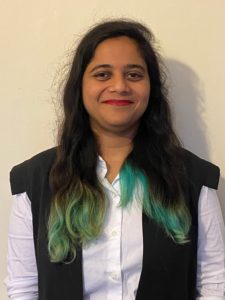
My name is Sheetal Jain, I am a third year DPhil student in the Faculty of History.
My research is on an organisation called All India Hindu Mahasabha, focusing on the politics of India. My DPhil research is dependent on archives, located specifically in India. This grant allowed me to visit National Memorial Museum and Library and National Archives of India located in New Delhi, India.
In my visit to the archives, I got the chance to examine the collection of papers of Hindu Mahasabha, Police records, and Census papers which are located in the Nehru Memorial and National Archives. I also examined the Microfilm section of Nehru Memorial which has Private papers and Newspaper collections. The documents gave me an idea to structure my thesis. I plan to build my thesis over the documents that I found during my research trip to India.
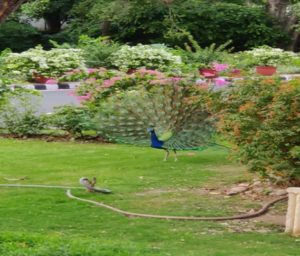
Peacock outside Nehru Memorial Museum and Library, New Delhi
Gaining access to the archives in India was crucial for me to complete my DPhil thesis project. I am extremely grateful to Kellogg for providing me with much needed financial assistance that helped me accomplish my DPhil research.
Urvi Khaitan (DPhil History)

The Kellogg Travel Grant enabled me to travel to Washington DC to conduct essential archival research for my DPhil thesis. I originally planned to travel in March 2020, but had to cancel due to the Covid-19 pandemic, so it was wonderful to finally be able to make the journey across the pond to access documents and manuscripts at the US National Archives, and the Library of Congress, that are key to my doctoral project.
I had a wonderful time in DC – the cherry blossoms were also in full bloom – and with the help of friendly archivists and librarians, I was able to make the best use of the resources available. The Library of Congress was spectacular and working in the Main Reading Room felt quite surreal. The materials I looked at have set me well on my way in the final year of my DPhil and I am very excited at the prospect of writing up my findings. I am so very grateful to Kellogg for contributing towards my travel costs for what has been a very memorable experience. Urvi Khaitan
Nicholas DeVito (DPhil Primary Health Care)
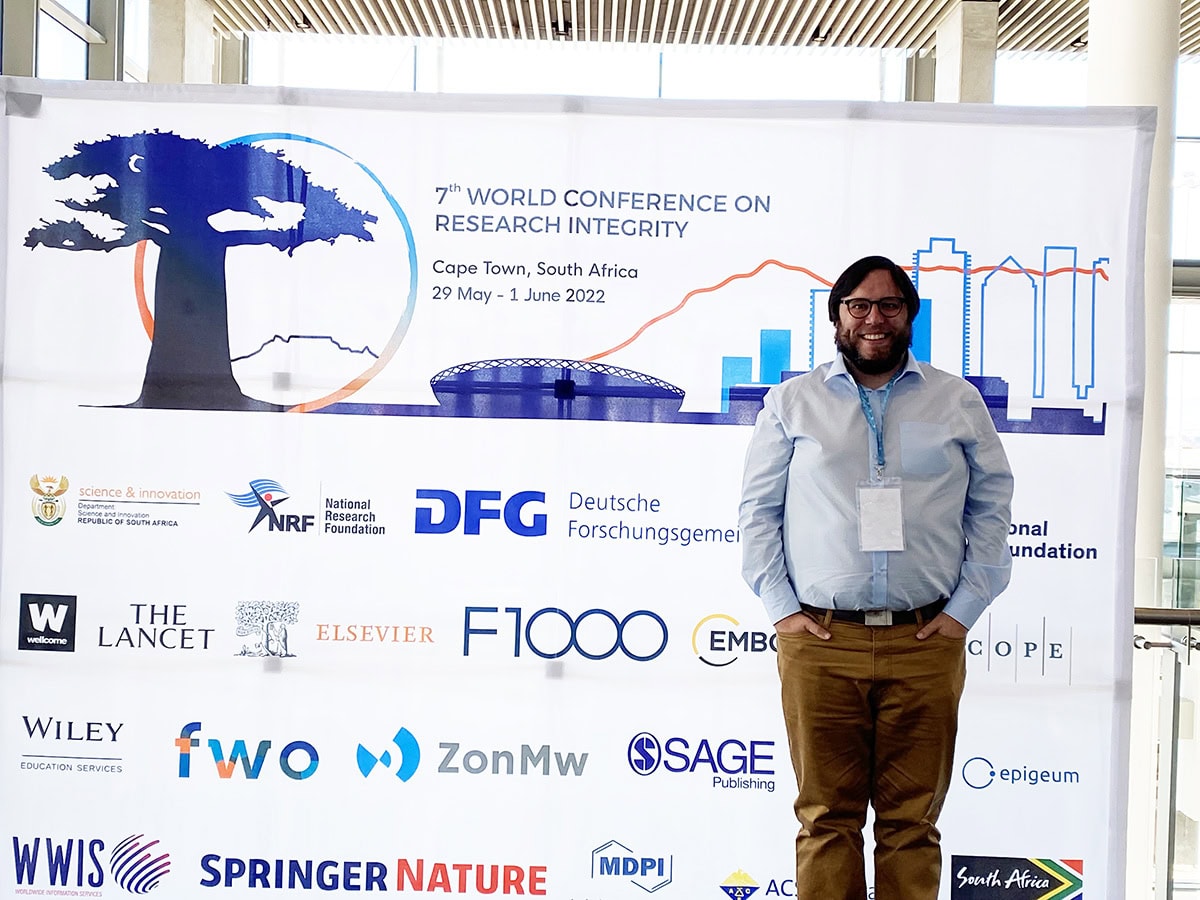
The 7th World Conference on Research Integrity was held in Cape Town, South Africa from May 29th to June 1st, 2022. The WCRI provides a forum for examining how to ensure research is conducted with rigour and to high ethical standards. Given the meeting was hosted in Africa for the first time, major topics of the conference were related to fostering productive and respectful international collaborations, diversity in study teams, and ensuring research integrity in lower resource settings. This offered fascinating perspectives and insights into areas of research I have not had much reason to consider in my own work to date, but will be useful to address, both practically and as topics for investigation, as my career progresses. However, my interests in the reporting of clinical trials, open science, and publication ethics, were also well represented throughout the conference.
I co-presented preliminary results of a project that formed the basis of one of my thesis chapters. This research concerns tracking the reporting of clinical trials during the COVID-19 pandemic, and was presented as part of the conferences early career researcher track. The presentation is attached to my final report. It is always valuable to share findings for feedback with the community and to see the work of people with similar academic interests. As I near completion of my DPhil, building out my professional and academic networks through sharing my work, and taking in the work of others, is essential for the next steps of my career. Finding potential collaborators, advisors, and mentors has been a hugely valuable experience at conferences and WCRI was no exception. For instance, I was able to make connections to Profs. Ana Marusic and Ben Mol, both whose work I cite frequently, and meet collaborators and colleagues from Germany who I have not had an opportunity to interact with in person due to COVID-19. This is in addition to various new connections I made to colleagues throughout the conference.
I’d like to thank Kellogg for providing me with a travel grant that allowed me to both share my work with, and learn from, my peers in the research integrity community. My research interests broadly deal with the topic of research integrity so having the ability to attend the flagship conference in the field as an early career researcher was incredibly valuable.
Elizabeth Thomas (DPhil in Primary Health Care)
The Kellogg Travel Grant supported my attendance at the Preventing Overdiagnosis Conference (PODC) in Calgary, Canada. I was selected to do an oral presentation based on one of my DPhil projects, which analysed laboratory test use by children in Oxfordshire from 2005 to 2020. My research area of interest is in overuse and underuse of medical tests in children. Overuse refers to tests that are performed unnecessarily, where a particular test can bring more harm than benefit to a child. This can be in the form of unnecessary treatment such as antibiotics, and its associated side effects. It also costs the overall health system when resources are diverted away from those who would benefit from them more. Conversely, when a test is under-utilised and children miss out on diagnoses that would benefit from treatment, then there are associated harms in terms of poor patient outcomes and further straining health resources. We are at a critical point in time with health expenditure rising dramatically. Appropriate use of health care is one of the key solutions to the sustainability of health systems. My thesis aims to highlight areas of variation in diagnostic test use by children within the general practice setting. By reducing variation in care, we ensure that no matter who you are, where you live and what your background is, you will receive the same quality of care.
The PODC in Calgary returned to an in-person format since the pandemic. I enjoyed presenting the findings of my project and received thoughtful questions and feedback from experts in the field. I later found out I was shortlisted for the Lisa Schwartz Prize for early career researchers. Having attended the last face-to-face conference in Sydney in 2019, I was excited to connect with colleagues from around the world who are all working in varied areas of overdiagnosis ranging from breast cancer to cardiovascular disease and attention deficit hyperactivity disorder. While the conference focuses on one side of the coin, the keynote speakers emphasised that underdiagnosis remains a major concern, particularly for low and middle-income countries. I found it interesting to see how the conversations at PODC have evolved over the years I have attended it in 2016, 2019 and 2022. This year there was a focus on lessons learned from the pandemic. The two-year period was a natural experiment that allowed researchers to observe the rates of testing when people during the pandemic reduced their interactions with health care, highlighting areas of over-testing. For the first time there was also an emphasis on the alarmingly high contribution of health care to the climate crisis. If the health sector was represented by a country it would be the fifth-largest polluter globally. This, perhaps more than any other reason, should be the main impetus to identify and address areas of health care waste. Often the issue of overuse is not a conscious decision made by clinicians or patients, but is shaped by and entrenched within the systems that inform clinical decision-making. We need to make it easier for clinicians to request tests and treatments by providing the infrastructure, tools and support to deliver high-quality care that is feasible, cost-effective and equitable.
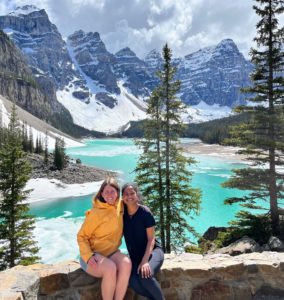
I am grateful to Kellogg College for providing me with the opportunity to travel to Canada attend the conference, present my research and foster new international collaborations to push this important area of research forward.
Szilvi Watson (DPhil in Education)
I undertook two research field trips in May 2022, for my DPhil T he experiences of Christian postgraduate students at universities in England, to conduct interviews and get an ethnographic feel to my case study sites.
I took the train to Winchester on the 17th of May. I stayed in a little Airbnb close to the city centre and within walking distance of the University. I explored the University grounds on the first day, examining what sort of ethos is displayed through signs and displays, naming of buildings and how students interact on campus, how far it is from the city, etc. The following days I conducted six interviews with students and leaders, including the chaplain and the leader of student ministries in a local church. These mostly took place on campus. I also visited some places and events relevant to my study, such as services some interviewees pointed out as a source of encouragement to them in their faith – evensong at the Cathedral, for example.
On the 23rd of May I travelled to Manchester, where I carried out very similar activities to those in Winchester, but had a much larger sample to draw on; I conducted 14 interviews. All of these took place on campus, mostly at St Peter’s House and their café, which is in a central location of the University and belongs to the chaplaincy. I interviewed 11 students and the University Chaplain, the Catholic Chaplain, and a leader of a postgraduate and staff fellowship group. I visited both chaplaincies, some local churches and University buildings. I stayed in an Airbnb again, very close to campus and walked everywhere, discovering the city and the campus, to get a feel for the student experience. I took the train back on the 27th of May, to Oxford.
These two trips were essential and invaluable for my research. I am utterly thankful to the College for allowing me to partake in these activities through their generous grant, which I would not have been able to finance myself.
View some of Silvi’s images from her trips
Giuseppe Spatafora (DPhil International Relations)
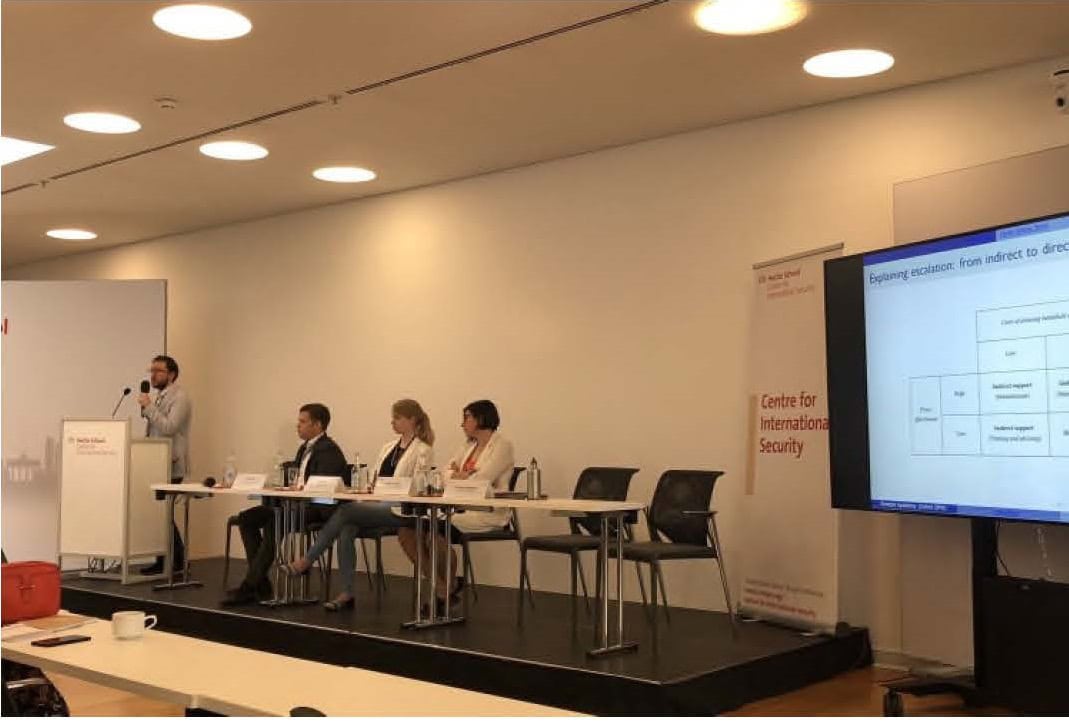
I was lucky to receive a Kellogg Travel Grant to fund my participation in the European Initiative for Security Studies (EISS) 2022 conference at the Hertie School of Governance in Berlin. EISS is a pan-European, multidisciplinary network of scholars of security studies in Europe. It is the largest and most diverse network of its kind. The goals of EISS are to overcome the existing fragmentation in the study of security and defence across Europe, and to contribute to public debates through academic research and instruction. I recognise my own goals and ambitions in these values: I also aim to contribute to developing a better and multidisciplinary understanding of security studies in Europe to inform better security and defence policy. Throughout my DPhil years, I have strived to realise this goal, by researching external intervention in civil wars, teaching international security and conflict, and working with international security institutions. EISS 2022 represented an excellent opportunity to showcase my research and meet likeminded people in this field.
At EISS, I presented my research at a panel on “External Sponsorship and Conflict Intervention”. The panel was made up only of PhD/DPhil students, which allowed each of us to showcase the cutting-edge research that we are doing. I presented my dissertation on the escalation of external support by foreign states in civil war. ‘Why’ I asked, ‘do some states move from providing military assistance to one or more warring parties, to partaking in combat with their own armed forces?’ I argued that states choose to intervene directly when they want to have rapid military impact, their proxy is unable to transform the resources provided into effective combat power, and the costs of escalation are limited. At the conference, I presented the theoretical argument as well as the empirical evidence for my first case study, consisting of archival evidence on Fascist Italy’s intervention in the Spanish Civil War (1936-39).
The EISS was the first opportunity to present my work in person beyond Oxford after two years of online-only conferences and workshops. I could finally experience the joy and enthusiasm of delivering my presentation, chatting with my fellow panellists during and after the panel, and having a nice dinner with other participants at the end of the day. I would like to thank the Kellogg Travel Grant awarding committee for allowing me to have this excellent experience with their financial assistance.

Tonny Kukeera (DPhil Geography and the Environment)
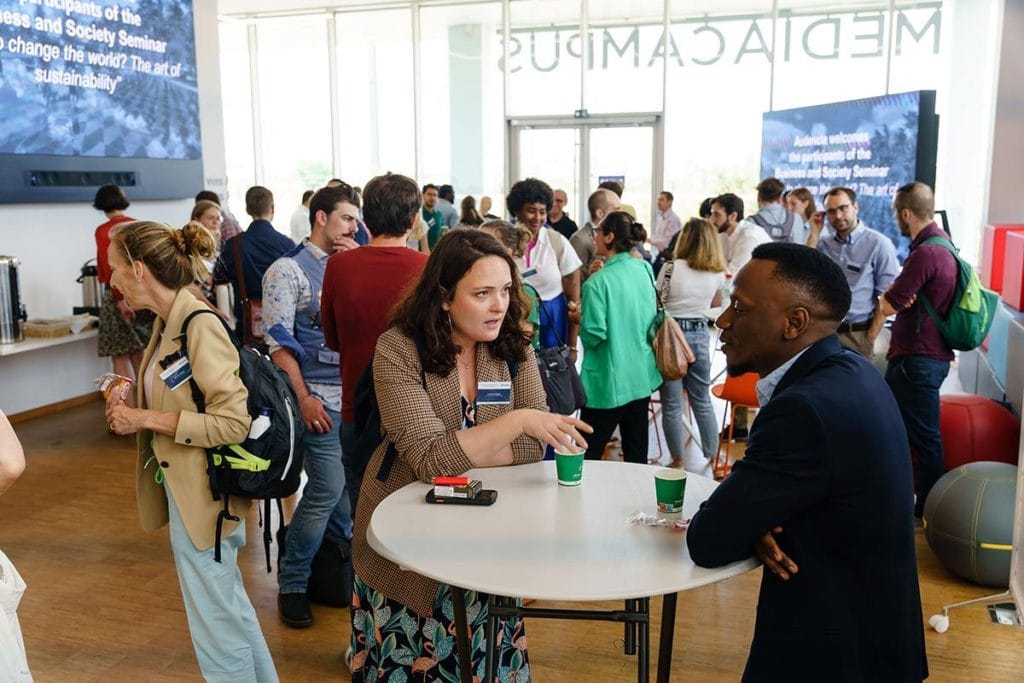
Owing to calls from global leaders to transform the current world systems, the role of science and research has never been this critical. The necessity to accelerate the sustainability transition by providing objective, evidence-based ways to solve problems, for example, is on top of most organisations’ agendas. Indeed, this is key to guiding governments, businesses, and industry on how to respond to society’s needs and the environment. The Business and Society conference dubbed “How to change the world? The art of sustainability” was one of such initiatives that aimed at contributing to this discourse. I am glad to have been part of the 90 international scholars & Ph.D. students who spent two days discussing their research in sustainable business, corporate social responsibility, sustainable development, social innovation & entrepreneurship.
My DPhil work concerns sustainability and innovation in the energy sector. This involves studying what strategies can align the electricity sector to target poverty reduction, inequalities, and ultimately sustainable development in Sub-Saharan Africa. Specifically, I am investigating pathways through which private companies in the renewable energy sector can deliver affordable electricity beyond lighting. At the conference, I presented one of my DPhil papers emphasizing the role of partnerships and innovations in accentuating electricity access to target multiple development goals.
The event was a great opportunity as it allowed me to connect with like-minded scholars whose support is instrumental in building my academic career and improving my understanding of the issues in my field of expertise. The symposium was an excellent opportunity for me to share my work and receive feedback from colleagues and experienced scholars in my field. I hope to build on these engagements in the near future to forge collaborations on different study topics.
I am profoundly grateful to my college, Kellogg, for the support through the travel grant, without which it could have been much more difficult to attend such events.
Melanie Golob (DPhil Evidence-Based Health Care)
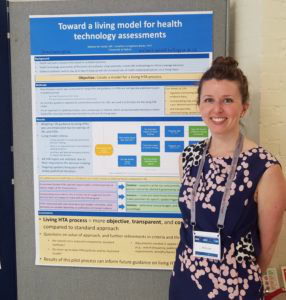
Juan E Berner (DPhil Evidence-Based Health Care)
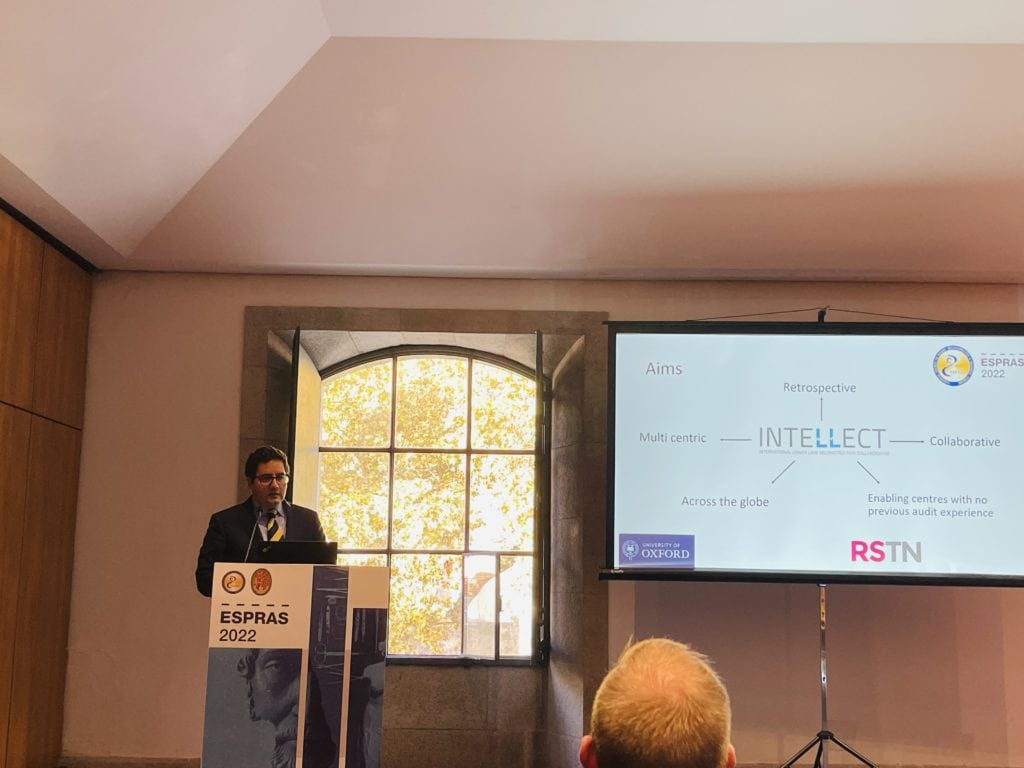
The European Society of Plastic, Reconstructive and Aesthetic Surgery (ESPRAS) is the confederation that brings together the European national societies and associations of Plastic Surgery. The ESPRAS scientific congress is held every four years with a programme that combines invited key speakers and free research papers. As part of my DPhil in Evidence-Based Healthcare I have been working on gathering data to better understand how open lower limb fractures are treated worldwide. I was honoured that the ESPRAS Scientific Committee accepted the INTELLECT study for presentation this year in Porto, Portugal. This allowed me to disseminate my research among surgeons with an interest in lower limb reconstruction. I received very positive feedback and was able to meet other clinicians with similar interest and happy to establish new collaborations! I just want to thank Kellogg College, as the Kellogg Travel Grant allowed me to cover most of the expenses for this meeting.
Peter DeBartolo (DPhil in Sustainable Urban Development)
As a DPhil candidate in Sustainable Urban Development at Kellogg College, my research focuses on how post-9/11 counter-terrorism surveillance has informed, impacted, and contributed to the geographical reimagining and remapping of Arab and Muslim communities in New York City.
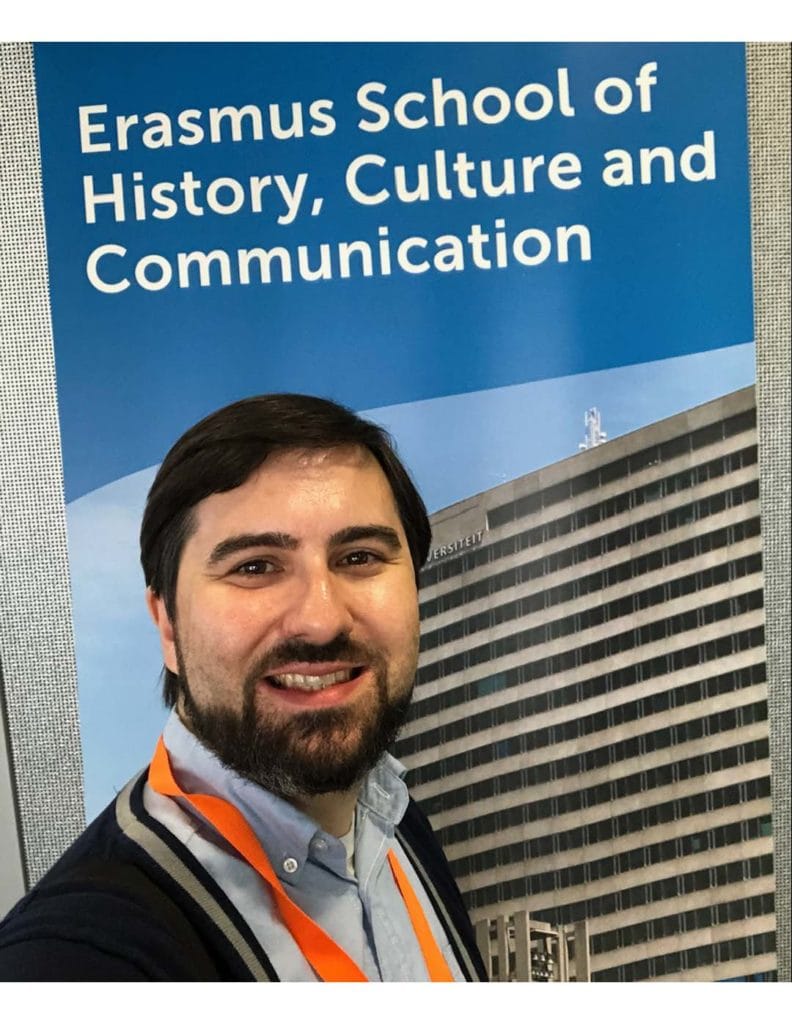
Conference sessions covered a wide range of surveillance-related research topics. These included smart cities, predictive policing, artificial intelligence, bodies and tracking, privacy law, algorithms, sustainability, borders and migration, housing, law and technology, data justice, public health, intelligence and national security, and facial recognition, among many others.
Participating in this unique conference and colloquium provided me with exceptional opportunities to discuss my research with and gather constructive feedback from fellow doctoral candidates and world-leading scholars in surveillance studies. In fact, input received from my presentation has inspired me to continue to further develop my research in new directions. Being involved in this event also allowed me to deeply immerse myself in global discussions, debates, and cutting-edge research about the future of cities and the role of surveillance in the evolution of urban environments. Additionally, since this was the first time this biennial conference has convened since 2018 due to the COVID-19 pandemic, I had the rare chance to personally connect and network with many professional colleagues, peers, mentors, and scholars within this academic community.
None of these experiences would have been possible without the support of Kellogg College. I would like to express my deep gratitude to the College for providing me with crucial funding to attend this conference and thank my supervisor Dr David Howard, a Fellow of Kellogg College, for his support for my travel grant application and ongoing guidance.
Genevieve Cain (DPhil in Archaeology)
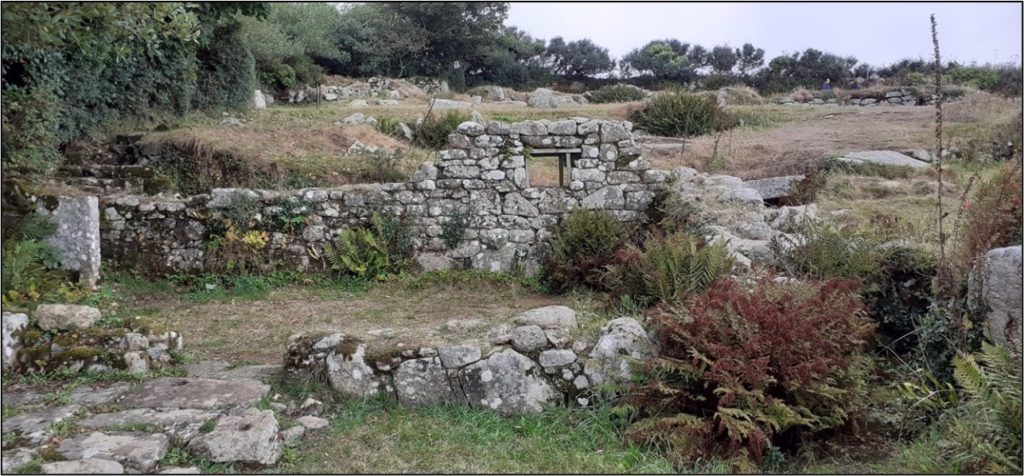
I have recently returned from a wonderful few days in Cornwall. This was a research trip, very kindly supported by the Kellogg College Travel Grant. My principal goal was to get a real feel for the Cornish landscapes and its archaeology, in the hopes of forming a deeper contextual understanding with my own study area of Wales. The subject of my DPhil research is in defining and characterising a mysterious kingdom known as Brycheiniog (pronounced bruh-kine-eeog), which is thought to have been centred on the upper Usk Valley – the Usk being the river that rises in the western Brecon Beacons (mountain range), flowing through the town of Brecon, and making its way eventually all the way down to the Severn Estuary. I am a landscape archaeologist – which means that I take a particular interest in looking at how landscapes have been knitted together through time using a variety of [usually] non-invasive techniques.
This has been such an insightful research trip, and my thanks again to Kellogg College for the financial support to make this happen.
Read Genevieve’s full report
Cherise Regier (DPhil in Social Intervention and Policy Evaluation)
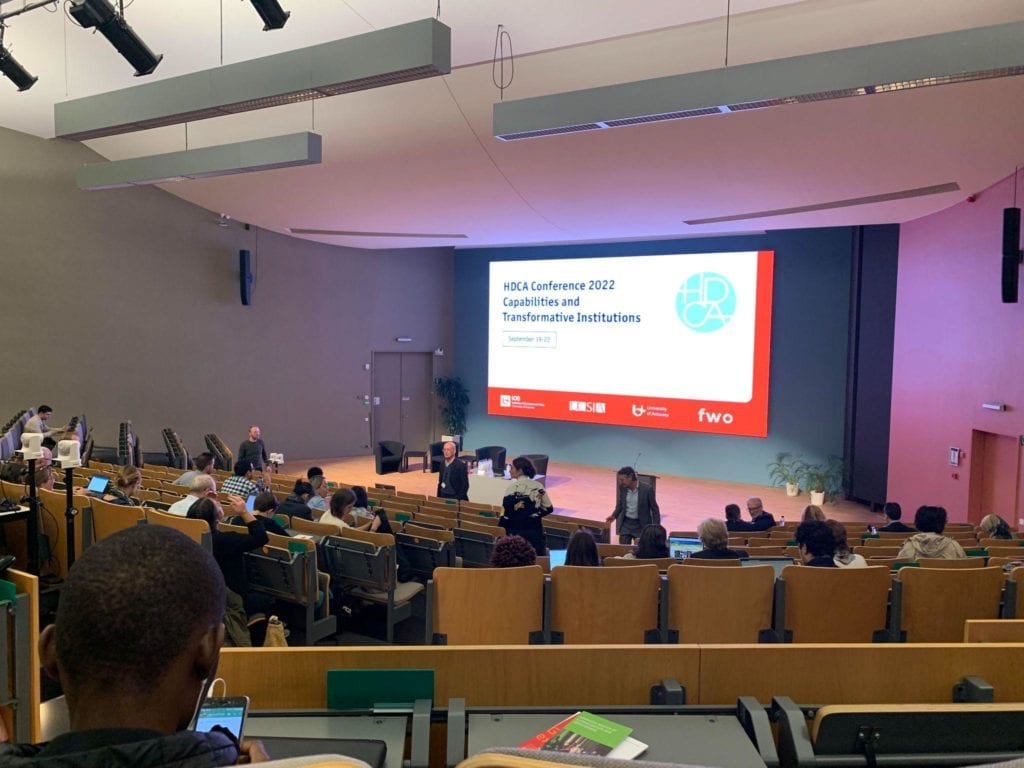
My doctoral thesis explores the dynamic relationship between labour market policy and worker wellbeing. To do this, I am utilizing Amartya Sen’s capability approach as a conceptual framework for evaluating the effectiveness of labour law designed to promote employee voice in the workplace. This represents a novel approach to employment relations research that opens up the possibility for new insights into the root mechanisms that drive modern employment conditions and their wellbeing outcomes.
From September 17th to 22nd I travelled to Antwerp, Belgium to attend the Human Development and Capabilities Association (HDCA) Summer School and Conference. The summer school is designed for graduate students who are working with the capability approach (CA) to develop their knowledge and understanding of its key concepts. Over the span of two days, I participated in several sessions lead by senior HDCA academics on the following topics:
– Capabilities and Health Equity – Capability Measurement – Development Ethics – Children, Education, and the Capability Approach
During the summer school, I also participated in two breakout groups where each student presented their research. I provided and received valuable feedback regarding specific research challenges such as capability measurement issues, conceptualization, and operationalization. I cultivated friendships with many of the other students and plan to stay in touch with them moving forward.
Following the summer school programme, I attended the HDCA conference. This year’s theme, “Capabilities and Transformative Institutions,” was particularly relevant to my research and as a result, there were several sessions that I found useful and interesting such as:
– Consequences of market dominance for inequalities and living standards – Measuring wellbeing in advanced economies – Health, Lifestyle, and Preferences – Measuring multidimensional Quality of Employment – Transformative Institutions, Future-Making, and the Capability to Aspire
I also presented a research paper I wrote for my doctoral thesis outlining my evaluative framework for employee voice legislation at the young-scholar-meets-senior-scholar session: socio-economic policy. This session allowed me to engage with other doctoral students and senior scholars utilizing the CA for similar purposes. I received more valuable feedback and advice tailored specifically to my paper that will strengthen my research in ways that would not be possible otherwise.
Overall, I had a wonderful experience at the HDCA summer school and conference and hope to attend again in future years. There are no faculty members or other DPhil students in my department using the CA, so it was exciting to be surrounded by so many people as passionate as I am about the approach. I left feeling both motivated and inspired.
Stephanie Eagling-Peche (DPhil Social Intervention and Policy Evaluation)
These funds provided me with the opportunity travel to Mae Sot, Thailand to conduct formative research for the first phase of my doctoral research through contributing to the cost of my flights. The purpose of the formative research was to understand parenting practises and coping strategies utilised by migrant families from Myanmar, currently residing in the Tak province. Over four weeks we conducted 18 caregiver focus groups with a total of 142 participants, and six adolescent groups with a total of 24 participants. We also ran a small-scale feasibility test of audio computer assisted self-interview survey measures. Caregivers and adolescents were recruited through Migrant Learning Centres across four rural and five urban locations. These focus groups provided insights into the challenges faced by caregivers in the region, and existing mechanisms for navigating the complex socio-political space, including managing daily stressors that are associated with parenting in this context. The results of this research will be used as groundwork for developing two interventions. The first will take a population-based approach in the form of a film-based intervention, evaluated through a cluster randomised-controlled trial. Caregivers identified as needing more intensive support will then be offered the opportunity to take part in a caregiver focused intervention, in the form of a culturally and contextually adapted parenting and mental health programme. The adaptation of the latter intervention will form a substantive part of my doctoral research and would not have been possible without the formative research, supported by the Kellogg College Travel Grant.
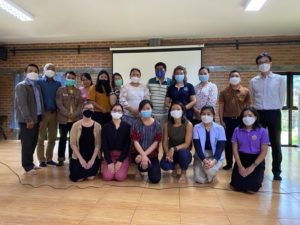
Convening The First Advisory Committee Meeting
We also convened the first meeting of the study advisory committee with members from Karen and Burmese Community Based Organisations (CBOs), representatives from Thailand Government Ministries and academic partners from Mahidol University and Chiang Mai University. The meeting was an invaluable opportunity to develop both academic and implementation networks as an early career researcher.
I am very grateful to Kellogg College for providing me with funding to conduct this research, which will form an integral part of my doctoral thesis.
Sam Webb (DPhil Experimental Psychology)
The UK Stroke Forum is the main and largest national conference in the UK concerning stroke research, and it brings together multiple disciplines including medics, health and allied health professionals, psychologists and more. At the 2022 conference I presented my work entitled: ‘Predicting activities of daily living and subjective cognitive failures with the Oxford Digital Multiple Errands Test (OxMET)’. I was awarded a travel grant from Kellogg College to attend this conference.
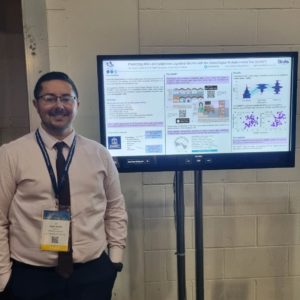
The conference was an excellent opportunity to network with likeminded researchers, which lead to a collaboration, and to present my research on our new app, which lead to new users requesting licenses. It was a very successful conference and I thank Kellogg College for part funding this trip.
Mhairi Reid (DPhil Environmental Research (NERC DTP))
In October 2023 I attended the Society of Vertebrate Palaeontology (SVP) annual meeting in Toronto, Canada. This international conference covers all topics on vertebrate palaeontology and since my research is focused on early bird evolution, this conference provided an opportunity to meet experts in my field and discuss my DPhil project with other researchers. I presented a poster at this conference “The evolution and Phylogeny of early Telluraves” where I was able to present my initial findings from my DPhil project. Without the Travel Fund Grant, I would not have been able to make it to this conference, an important step in my professional academic career.
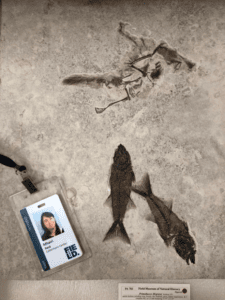

We understand that funding is a huge issue for most applicants, but there is a finite amount of funding available through the university and colleges. Funding is very competitive and only a small proportion of offers will be funded (approximately 20% of students from the 2021 intake received university/college funding). You are therefore strongly encouraged to search for external sources of funding.
Funding is available at a university, divisional, and college level. Some awards are available to all students and some have specific criteria such as subject, nationality, type of degree, age, gender, or a combination of these. Not all awards are available every year.
Applying for funding
Most awards do not require a separate application and all offer-holders are automatically considered for all the awards for which they are eligible. However, some awards do require a separate application and you must check before you submit your (course) application:
- Information university and divisional awards are on the university scholarship page
- Some college awards require the applicant to name that college on their application.
Once you have submitted your application, you cannot submit anything further that will influence funding decisions.
Faculty nominations
The first stage of the funding process is for the Faculty to submit nominations for the big (in terms of numbers awarded) awards: AHRC, ESRC, Clarendon, Ertegun. Faculty assessors from each strand make recommendations for funding, which are gathered together by the History funding committee, who decide which candidates to nominate. The Faculty is only allowed to make a certain number of nominations for each award. Nominations from all relevant faculties/departments are considered by a board for each award, who decide which candidates are awarded funding. Successful candidates are notified directly by the funding board.
AHRC funding via the Open-Oxford-Cambridge Doctoral Partnership (OOC DTP)
- Requires a separate application form
- You must tick the box on the (course) application box
- Only available for DPhil study
Clarendon Awards
- No separate application needed
- Open to all graduate candidates across the university
Economic and Social Research Council Grand Union Doctoral Training Partnership (ESRC DTP)
- Open to Economic and Social History only
- Available for DPhil study and Masters applicants who intend to continue to a DPhil
Ertegun Graduate Scholarship Programme in the Humanities
Ahrc cdp studentship - growing up queer: 1790-1918.
Your application should include:
- Applications should be submitted to by Friday 3rd May (midday, UK time)
- A personal statement (max 600 words) demonstrating your interests and aptitude for exploiting the distinctive opportunity the studentship provides.
- A research proposal (max1,500 words) outlining your anticipated research focus, questions and methods within the remit set out above.
- A sample of academic writing – for example, an MA / MSt essay or dissertation.
Faculty nominations for these awards are made by the end of February, and successful candidates notified in April.
For scholarships with specific eligibility criteria, the Faculty will be given a list of eligible candidates and asked to nominate a certain number of candidates from that list. Nominations for these awards are usually made from mid-April onwards.
Funding and colleges
Some colleges have funding awards of their own that are separate from central university funding. You need to check each college individually for these awards and their terms and conditions. The Faculty nominates candidates for certain awards, but there are also awards that do not involve the Faculty and are made directly by the college.
If you have been awarded funding linked to a particular college, you must accept a place at that college. If you have already been made an offer by a different college, you will be moved college.
Have I got funding?
You will be contacted by email if you are awarded funding. The email will come directly from the body awarding the funding, not the Faculty. Notifications are usually sent out between the end of March and the end of May, but could continue into June.
If you have not been awarded funding you will not be contacted.
Please note that you will be informed of funding decisions directly by the funding body, not the Faculty. We don’t know exactly when decisions will be made, or candidates notified!
This fully-funded studentship is available from October 2024. The award will cover course fees for the duration of DPhil fee liability, and a living cost stipend at the annual UKRI rate (£19,237 in 2024-25)
Closing date: Midday, Friday May 3rd

University of Oxford | Fees and Funding
Full details of all scholarships are available here.
Research Grants
Rai research grants.
Thanks to the generosity of benefactors, the Rothermere American Institute awards at least five research grants each year for primary research on the history, politics, literature or culture of the United States.

Eligibility and Process
In view of the climate crisis, the RAI is committed to promoting low-carbon research practices, and has therefore reframed travel grants as research grants. We are now willing to consider requests for financial support in relation to research costs other than travel. Such applications might, for instance, seek assistance in paying for the digitisation of documents, a research assistant, or transcription services in order to remove the need for international travel. We recommend reviewing the University’s guidelines on sustainability practices in relation to international travel: International travel | Sustainability (ox.ac.uk)
The following categories of person are eligible to apply for a research grant:
- Postgraduate Members of the RAI
- Postdoctoral Fellows of the RAI
- Fellows of the RAI without access to personal research funds
Applications are reviewed by the RAI Academic Committee every term.
Applications may only be made for travel or other research activity to be undertaken after the Committee meeting at which they will be considered. Retrospective applications are not accepted.
Applicants may only be awarded one research grant per academic year. Unsuccessful applicants may reapply each term. Successful applicants are awarded £500.
Research activity and reporting must be completed within one calendar year of the date the grant was awarded.
The research project to be supported must relate to the history, politics, literature or culture of the United States. Preference will be given to applicants who can demonstrate that their proposed travel or research activity will have a direct impact on the progress of their thesis or project. The Committee is willing to consider applications in support of conference attendance, insofar as it would benefit or disseminate primary research by the applicant.
Applications consist of a completed research grant application form . Completed forms should be sent to [email protected] by midday on Monday of Week 3 of each term.
RAI-Gilder Lehrman Fellows' Awards
In partnership with the Gilder Lehrman Institute of American History (GLI), the leading non-profit organisation for history education for schools and the general public, the RAI is able to offer special awards each year for research in archives in the New York area.
The RAI-Gilder Lehrman Fellows' awards are open to undergraduate and graduate students. Awardees will receive the RAI's travel award as described above; in addition, the GLI will aim to provide free access to the New-York Historical Society, the digital archive of the Gilder Lehrman Collection, and use of a desk if/as available at the Institute's offices on W. 45th St., New York. GLI will also advise awardees on visiting speakers and programmes on American history across New York City and offer them information about archives in NYC as well as introductions, as appropriate, to curators and historians in their field of research.
Should the awardees' research visits to New York coincide with one of the five major annual award presentations sponsored by the GLI (Frederick Douglass Book Prize; George Washington Prize; Gilder Lehrman Lincoln Prize; Gilder Lehrman Prize for Military History; National History Teachers of the Year Awards), they would be welcome to attend as a guest.
There is no special application process for the RAI-Gilder Lehrman awards. Applicants should apply for a postgraduate or undergraduate award as above, and recipients of the RAI-Gilder Lehrman awards will be selected from among the successful candidates.
The RAI Travel Award funded an extended visit to New York where I was able to visit many archives otherwise inaccessible to me. In particular, the resources at the New York Academy of Medicine and the Schomburg Center for Research in Black Culture were completely invaluable to my project. Going through my notes and files from the archives I visited I am always surprised at the richness and diversity of the source material the RAI Travel Award funded archive trip allowed me to access. My project has been greatly enriched as a result. Ella St George Carey, RAI travel grant recipient
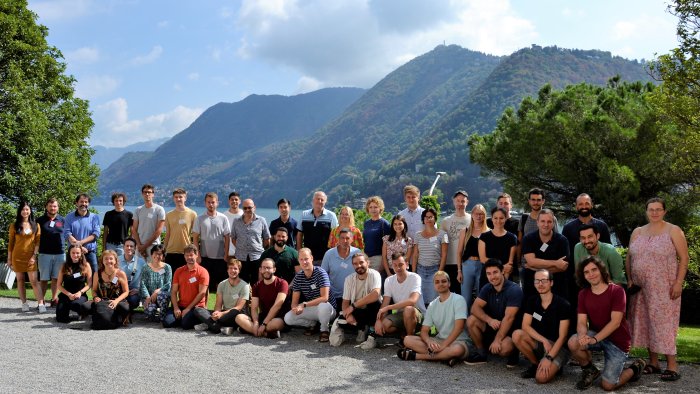
Travel, Research and Vacation Project Grants
Wolfson College supports students' academic and personal development with two dedicated grants; Travel & Research (for academic activities) and Vacation Project grants (for internships, cultural projects or charitable work).
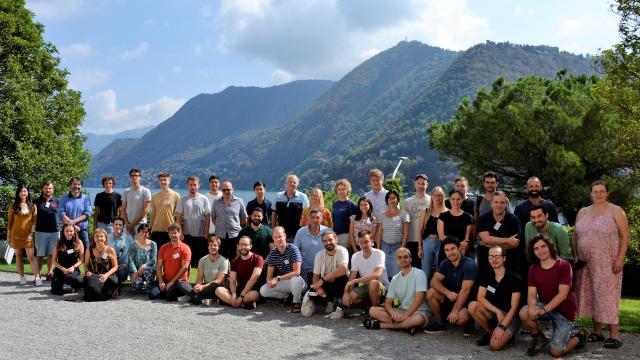
Travel & Research Grants
Travel & Research Grants assist students with the costs of conducting research and/or presenting it at conferences. They are awarded on a competitive basis. Students who have been unsuccessful in a previous application are encouraged to apply again. Roughly 70 awards are available each year.
Travel & Research Grants might support:
- Travel, accommodation and /or registration fees to present a paper or a poster at an academic conference or to chair a session.
- Awards of up to £150 to cover the costs of attending a conference that is directly relevant to the student’s research interests, but at which the student is neither making a presentation nor chairing a session.
- Travel and accommodation necessary for archival work, data collection, fieldwork or periods of necessary research in another University.
- Costs to learn or improve language skills in order to sit mandatory exams, read essential literature or conduct interviews that are directly related to the student’s research.
Travel & Research Grants will not ordinarily support:
- Computer hardware, software licenses, purchase of books, reagents
- General interest language courses or courses in academic English, meals and other incidental costs while traveling for research
- Expenses that could be covered by other sources, e.g. departmental or Faculty fieldwork budgets, doctoral training funds linked with particular studentship awards, etc.
Undergraduates may apply for up to £400 in each year of full-time study. Students on one or two-year postgraduate courses (e.g. MPhil, LLM, MMus, MEd, MSt) may receive up to £400 in total during their course.
PhD students may receive up to £1200 in total during the first three years of their course. They may choose to apply for multiple awards or to use the entire amount to fund an extended period or research or an international conference presentation.
Applications are not ordinarily accepted from PhD students who are no longer paying the University composition fee (e.g. after the 3rd year of full-time study or the 6th year of part-time study). No awards will be made to students who have already submitted the dissertation for examination.
Both undergraduate and postgraduate students may apply for Travel and Research grants. No grants will be awarded to students for activities to be undertaken after graduation or, in the case of doctoral students, after the submission of their thesis.
Travel & Research grants are intended to support subject-specific research that is essential to the student's course. Projects that are not directly related to a student’s research may instead be funded from the Wolfson College Vacation Project Grants.
Applications and references for Travel & Research Grants should be submitted by:
- 22 November for projects to be undertaken in December and January
- 16 January or 13 February for projects to be undertaken in March and April
- 23 April or 30 May for projects to be undertaken between May and October.
Only students who will still be enrolled as a student at Wolfson College in 2023-2024 are eligible for travel & research funding over the Long Vacation (June-September).
It is the student's responsibility to get the references submitted five days before the Student Finance Committee meets. Any incomplete applications will not be looked at (Meeting dates are 5th December, 30th January, 27th February, 7th May and 18th June).
Please complete the Travel & Research Grant online application form and ensure that your Tutor and Director of Studies (for undergrads) or your Tutor and Supervisor (for postgrads) submit the required online reference; all before the deadlines stipulated in the section above.
In the application form you must:
- Provide a complete, realistic budget and evidence of projected expenses (i.e., quotes for travel and accommodation costs). It is assumed that the cheapest available transport and accommodation will be chosen. Grants will not cover the cost of food, drink or incidentals.
- Indicate what other support is available or already secured (from your department/faculty, funding agency or other source) to cover your costs.
- Indicate how you will cover any costs that available and/or anticipated funding cannot meet.
- Explain why it is important and necessary to attend this conference or conduct this research and how it fits into your studies.
- Indicate that you have discussed your plans with your Tutor and Director of Studies (for undergrads) or your Tutor and Supervisor (for postgrads) and they will be sent the reference link once you have completed the form.
- Once you have received a response from the Committee on your award, please use this link to upload your documents.
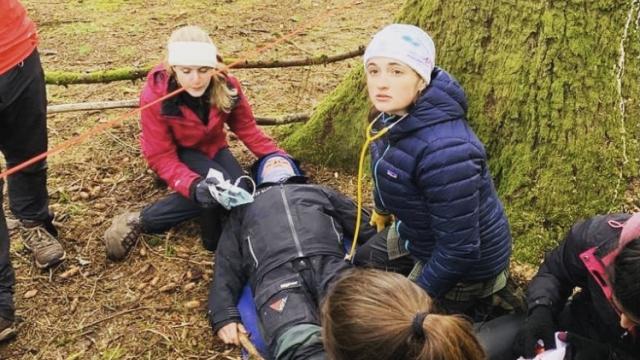
Vacation Project Grants
Vacation Project Grants support activities that are broadly educational, but that do not qualify for a Travel & Research Grant. They are awarded on a competitive basis. Students who have been unsuccessful in a previous application are encouraged to apply again. Up to 10 awards are available each year.
Vacation Project Grants may support:
- Volunteer work for charities or non-profit community organisations
- Unpaid or low-paid internships or laboratory research
- Unpaid or low-paid projects in the arts (e.g. summer theatre)
- Any project with a meaningful charitable, cultural or broadly educational purpose (e.g. participating in an archaeological dig, presenting a play at the Edinburgh Fringe)
Vacation Project Grants will not support:
- General-interest travel
A student may receive up to a total of £400 for vacation projects during the course of their studies at Wolfson.
Students may apply for the full amount to fund a single project or apply for smaller amounts to fund several projects during their course of study; as funds are limited, however, first-time applicants may be given priority over those who are applying for funding to support a second project.
Vacation Project Grants will cover no more than 50% of the costs of any project; the student is responsible for raising the remainder from other sources.
All undergraduate and postgraduate students may apply for Vacation Project grants to fund activities during termly vacations.
PhD students may also apply for a Vacation Project Grant during any period of annual leave agreed with their supervisor. Students on one-year courses (e.g. MPhil or LLM) are only eligible to apply for Vacation Project Grants to cover activities during the Christmas or Easter vacations.
No grants will be awarded to students for activities to be undertaken after graduation or, in the case of postgraduate students, after the submission of their thesis.
Applications for Vacation Project Grants should be submitted by:
Only students who will still be enrolled as a student at Wolfson College in 2023-2024 are eligible for Vacation Project Grants over the Long Vacation (June-September).
It is the student's responsibility to get the reference submitted five days before the Student Finance Committee meets. Any incomplete applications will not be looked at (Meeting dates are 5th December, 30th January, 27th February, 7th May and 18th June).
Please complete the Vacation Project Grant online application form and ensure that your Tutor and Director of Studies (for undergrads) or your Tutor and Supervisor (for postgrads) submits the required online reference; all before the deadlines stipulated in the section above.
- Provide a complete, realistic budget and evidence of projected expenses (i.e., quotes for travel and accommodation costs). It is assumed that the cheapest available transport and accommodation will be chosen. Grants will not cover the cost of food, drink, incidentals or participation fees for internship programmes.
- Indicate how you will fund the remainder of your costs, as well as any sources of funding already secured or anticipated.
- Explain the larger contribution that the Vacation Project will make to your personal development, and/or its larger significance.
- Indicate that you have discussed your plans with your Tutor and Director of Studies (for undergrads) or your Tutor and Supervisor (for postgrads) and they will be sent the reference link once you have completed the form.
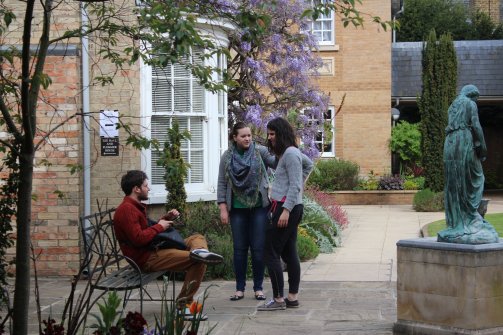

The Official Guide to Portland

Visitor Experience Enhancement Grants
Travel portland's grants are intended to support our mission of generating travel demand that drives economic impact for portland..
We’re dedicated to promoting our destination in bold, innovative and collaborative ways that harness Portland’s personality and values and that connect visitors to authentic experiences. We support those experiences through our grant program.
Since launching in January 2023, a total of $140,000 has been awarded to five projects across Portland through our Visitor Experience Enhancement Grant Program. Funded through lodging taxes and fees collected from hotels and short-term rentals within Portland, these grants support new product development and the rejuvenation of existing product that will enhance the visitor experience in Portland.
The 2024 grant cycle is now closed (see below timeline for key dates). Subsequent grant cycles will be announced in the Industry Update e-newsletter .
Log in to Travel Portland's Grant Platform
While the 2024 grant cycle is now closed, applicants can still view their application. Interested future applicants can create an account to get a head start on the next cycle.
Frequently Asked Questions
Can i view the application questions before i access the actual application, once i start the application, will i be able to save my work and return at another time, how will projects be selected for funding, can grant dollars awarded be used to hire and/or expand staff to build capacity, we were awarded a grant in a previous cycle. are we eligible for this cycle , can the budget include contractor or consultant fees , can our organization submit multiple applications.
For additional questions about eligibility criteria or the application process, contact [email protected] .
Visitor Experience Enhancement Grant Recipients
Since launching in January 2023, a total of $385,000 has been awarded to 15 projects across Portland through this grant program.
Additional Funding Opportunities
Check Travel Oregon's list of additional funding opportunities.
Was this page helpful?
Travel and Special Project Grants for Graduates
Funding is available from Somerville towards the cost of academic-related activity such as discretionary travel or projects. Please note that these awards cannot be used to fund core or compulsory elements of a student’s degree.
Trinity Term 2024 graduate application form
Eligibility
Enrolled graduates in the first four years of their course are eligible. Students who are on suspension, visiting students, associate students and finalists whose project will take place after the end of their course are not eligible. Applicants should be in need of financial support for discretionary travel or projects relating to their studies. Core or compulsory elements of a student’s degree cannot be funded through these awards. Students should also apply for other funding sources such as department or faculty travel grants. Please note that travel to places where students are usually resident when not in Oxford will not normally be funded.
The planned travel or project must start after a certain date each term. In Trinity Term this is Wednesday 22nd May. It is not possible to be awarded retrospective funding unless there are exceptional circumstances.
Award levels
Environmental sustainability is integral to Somerville’s commitment to social responsibility. Students who are applying for funding for travel within Europe are incentivised to choose lower carbon travel solutions. The following award levels will apply unless there are exceptional circumstances. These could include disabilities that prevent long train journeys, caring responsibilities or the need to avoid travelling through particular countries. All the figures shown are the maximum amounts available over the length of the course.
Students should refer to the University’s Guide to Sustainable Business Travel for information about reducing carbon emissions. They are also encouraged to offset flights using an offsetting scheme compliant with the Gold Standard .
Application process
- Graduates should complete the application form and email it to their Supervisor, copying in their College Adviser and [email protected] . We recommend that this is done at least a week before the application deadline. This is to allow enough time for Supervisors to complete their section. Students should also include any evidence of estimated or actual costs.
- Supervisors should complete their section and email the application form to [email protected] by the deadline. In Trinity Term this will be 12 noon on Monday 6th May.
- The Scholarships and Funding Officer will forward applications to College Advisers for their comments.
Application and project deadlines
Applications are accepted each term.
Decisions will be made by Somerville College Travel and Special Project Grants Committee.
Successful applicants will be expected to submit a report after the completion of their project.
If you have any queries, please email the Scholarships and Funding Officer .
Awards for Academic Achievement
Funding and opportunities.
- Private: Our Community – Archived
- A Brief History of Somerville
- Eminent Somervillians
- Undergraduate
- Life at Somerville
- Access & Outreach
- How to apply
- Open Days and Events
How tech giants cut corners to harvest data for AI
SAN FRANCISCO — In late 2021, OpenAI faced a supply problem.
The artificial intelligence lab had exhausted every reservoir of reputable English-language text on the internet as it developed its latest AI system. It needed more data to train the next version of its technology — lots more.
So OpenAI researchers created a speech recognition tool called Whisper. It could transcribe the audio from YouTube videos, yielding new conversational text that would make an AI system smarter.
Some OpenAI employees discussed how such a move might go against YouTube’s rules, three people with knowledge of the conversations said. YouTube, which is owned by Google, prohibits use of its videos for applications that are “independent” of the video platform.
Ultimately, an OpenAI team transcribed more than 1 million hours of YouTube videos, the people said. The team included Greg Brockman, OpenAI’s president, who personally helped collect the videos, two of the people said. The texts were then fed into a system called GPT-4, which was widely considered one of the world’s most powerful AI models and was the basis of the latest version of the ChatGPT chatbot.
The race to lead AI has become a desperate hunt for the digital data needed to advance the technology. To obtain that data, tech companies including OpenAI, Google and Meta have cut corners, ignored corporate policies and debated bending the law, according to an examination by The New York Times.
At Meta, which owns Facebook and Instagram, managers, lawyers and engineers last year discussed buying the publishing house Simon & Schuster to procure long works, according to recordings of internal meetings obtained by the Times. They also conferred on gathering copyrighted data from across the internet, even if that meant facing lawsuits. Negotiating licenses with publishers, artists, musicians and the news industry would take too long, they said.
- Microsoft, Amazon and UW partner with Japan for AI research and expansion
Like OpenAI, Google transcribed YouTube videos to harvest text for its AI models, five people with knowledge of the company’s practices said. That potentially violated the copyrights to the videos, which belong to their creators.
Last year, Google also broadened its terms of service. One motivation for the change, according to members of the company’s privacy team and an internal message viewed by the Times, was to allow Google to be able to tap publicly available Google Docs, restaurant reviews on Google Maps and other online material for more of its AI products.
The companies’ actions illustrate how online information — news stories, fictional works, message board posts, Wikipedia articles, computer programs, photos, podcasts and movie clips — has increasingly become the lifeblood of the booming AI industry. Creating innovative systems depends on having enough data to teach the technologies to instantly produce text, images, sounds and videos that resemble what a human creates.
The volume of data is crucial. Leading chatbot systems have learned from pools of digital text spanning as many as 3 trillion words, or roughly twice the number of words stored in Oxford University’s Bodleian Library, which has collected manuscripts since 1602. The most prized data, AI researchers said, is high-quality information, such as published books and articles, which have been carefully written and edited by professionals.
For years, the internet — with sites like Wikipedia and Reddit — was a seemingly endless source of data. But as AI advanced, tech companies sought more repositories. Google and Meta, which have billions of users who produce search queries and social media posts every day, were largely limited by privacy laws and their own policies from drawing on much of that content for AI.
Their situation is urgent. Tech companies could run through the high-quality data on the internet as soon as 2026, according to Epoch, a research institute. The companies are using the data faster than it is being produced.
“The only practical way for these tools to exist is if they can be trained on massive amounts of data without having to license that data,” Sy Damle, a lawyer who represents Andreessen Horowitz, a Silicon Valley venture capital firm, said of AI models last year in a public discussion about copyright law. “The data needed is so massive that even collective licensing really can’t work.”
Tech companies are so hungry for new data that some are developing “synthetic” information. This is not organic data created by humans, but text, images and code that AI models produce — in other words, the systems learn from what they themselves generate.
OpenAI said each of its AI models “has a unique data set that we curate to help their understanding of the world and remain globally competitive in research.” Google said that its AI models “are trained on some YouTube content,” which was allowed under agreements with YouTube creators, and that the company did not use data from office apps outside of an experimental program. Meta said it had “made aggressive investments” to integrate AI into its services and had billions of publicly shared images and videos from Instagram and Facebook for training its models.
For creators, the growing use of their works by AI companies has prompted lawsuits over copyright and licensing. The New York Times sued OpenAI and Microsoft last year for using copyrighted news articles without permission to train AI chatbots. OpenAI and Microsoft have said using the articles was “fair use,” or allowed under copyright law, because they transformed the works for a different purpose.
Transcribing YouTube
In May, Sam Altman, the CEO of OpenAI, acknowledged that AI companies would use up all viable data on the internet.
“That will run out,” he said in a speech at a tech conference.
Altman had seen the phenomenon up close. At OpenAI, researchers had gathered data for years, cleaned it and fed it into a vast pool of text to train the company’s language models. They had mined the computer code repository GitHub, vacuumed up databases of chess moves and drawn on data describing high school tests and homework assignments from the website Quizlet.
By late 2021, those supplies were depleted, said eight people with knowledge of the company, who were not authorized to speak publicly.
Most Read Business Stories
- Fremont Brewing sold to the owner of Pike Brewing
- Boeing says no 787 safety risk after whistleblower raises troubling claims VIEW
- Amazon sold a chemical that led to 15 deaths. Who is responsible?
- A look inside Amazon’s biggest warehouse in the Northwest VIEW
- U.S. homes face costly retrofits for induction stoves, EV chargers
OpenAI was desperate for more data to develop its next-generation AI model, GPT-4. So employees discussed transcribing podcasts, audiobooks and YouTube videos, the people said. They talked about creating data from scratch with AI systems. They also considered buying startups that had collected large amounts of digital data.
OpenAI eventually made Whisper, the speech recognition tool, to transcribe YouTube videos and podcasts, six people said. But YouTube prohibits people not only from using its videos for “independent” applications, but also from accessing its videos by “any automated means (such as robots, botnets or scrapers).”
OpenAI employees knew they were wading into a legal gray area, the people said, but believed that training AI with the videos was fair use. Brockman, OpenAI’s president, was listed in a research paper as a creator of Whisper. He personally helped gather YouTube videos and fed them into the technology, two people said.
Brockman referred requests for comment to OpenAI, which said it uses “numerous sources” of data.
Last year, OpenAI released GPT-4, which drew on the more than 1 million hours of YouTube videos that Whisper had transcribed. Brockman led the team that developed GPT-4.
Some Google employees were aware that OpenAI had harvested YouTube videos for data, two people with knowledge of the companies said. But they didn’t stop OpenAI because Google had also used transcripts of YouTube videos to train its AI models, the people said. That practice may have violated the copyrights of YouTube creators. So if Google made a fuss about OpenAI, there might be a public outcry against its own methods, the people said.
Matt Bryant, a Google spokesperson, said the company had no knowledge of OpenAI’s practices and prohibited “unauthorized scraping or downloading of YouTube content.” Google takes action when it has a clear legal or technical basis to do so, he said.
In late 2022, after OpenAI released ChatGPT and set off an industrywide race to catch up, Google researchers and engineers discussed tapping other user data. Billions of words sat in people’s Google Docs and other free Google apps. But the company’s privacy restrictions limited how they could use the data, three people with knowledge of Google’s practices said.
In June, Google’s legal department asked the privacy team to draft language to broaden what the company could use consumer data for, according to two members of the privacy team and an internal message viewed by the Times.
The privacy team wrote new terms so Google could tap the data for its “AI models and build products and features like Google Translate, Bard and Cloud AI capabilities,” which was a wider collection of AI technologies.
Bryant said the privacy policy changes had been made for clarity and that Google did not use information from Google Docs or related apps to train language models “without explicit permission” from users, referring to a voluntary program that allows users to test experimental features.
“We did not start training on additional types of data based on this language change,” he said.
The debate at Meta
Mark Zuckerberg, Meta’s CEO, had invested in AI for years — but suddenly found himself behind when OpenAI released ChatGPT in 2022. He immediately pushed to match and exceed ChatGPT, calling executives and engineers at all hours of the night to push them to develop a rival chatbot, said three current and former employees, who were not authorized to discuss confidential conversations.
But by early last year, Meta had hit the same hurdle as its rivals: not enough data.
Ahmad Al-Dahle, Meta’s vice president of generative AI, told executives that his team had used almost every available English-language book, essay, poem and news article on the internet to develop a model, according to recordings of internal meetings, which were shared by an employee.
Meta could not match ChatGPT unless it got more data, Al-Dahle told colleagues. In March and April 2023, some of the company’s business development leaders, engineers and lawyers met nearly daily to tackle the problem.
Some debated paying $10 a book for the full licensing rights to new titles. They discussed buying Simon & Schuster, which publishes authors such as Stephen King, according to the recordings.
They also talked about how they had summarized books, essays and other works from the internet without permission and discussed sucking up more, even if that meant facing lawsuits. One lawyer warned of “ethical” concerns around taking intellectual property from artists but was met with silence, according to the recordings.

IMAGES
COMMENTS
The grant. The value of each scholarship is usually up to £2,000, paid in two tranches; the first tranche of £1,000 will be paid before the end of Trinity Term to allow scholars to make travel and accommodation arrangements. The second tranche will be paid on receipt of a written report of approximately 3,000 words.
The Peter Kirk Travel Fund makes scholarships available to students, aged 17 to 30, currently studying at the University of Oxford at undergraduate or graduate level. Each scholarship is usually worth up to £2,000; there will be up to 6 awards given for travel in 2024.
Students should also apply for other funding sources such as department or faculty travel grants. Please note that travel to places where students are usually resident when not in Oxford will not normally be funded. The planned travel or project must start after a certain date each term. In Trinity Term this is Wednesday 22nd May.
Two St Anne's students, Jakob Lomar and Ayesha Chakravarti, win in the 10th Annual National Oxford Uehiro Prize in Practical Ethics. Mar 14, 2024. Forthcoming Events. ... JCR Research and Travel Grants . ... If you apply for a grant from an outside body (College Secretary's Noticeboard) you must indicate this on your application. ...
Kellogg College & the University of Oxford; Take part in College life; Studying at Oxford. Academic conduct & regulation; Academic dress; Academic Progress Meetings; Careers Service; ... 2022-23 Travel Grant Application Form. 2022-23 Travel Grant Application Form. College email contacts.
Burke Knapp Travel Grant. This scholarship is for students in pursuit of development issues in the Third World/Emerging Economies. Applications are invited for this travel fund, which has been established through the generous gift of the late Mr Joseph Burke Knapp, Honorary Fellow of St John's College.
Africa-Oxford travel grants. AfOx is a cross-University platform to support the development of equitable collaborations in research and teaching between staff at African institutions and collaborators in Oxford. AfOx travel grants support visits between potential collaborators in African institutions and their colleagues in Oxford, with a view ...
move to slideshow content. The University is committed to helping our staff choose ways of travelling on a day-to-day basis. We encourage you to: Cycle or walk where possible. Consider using the Park and Ride or Park and Stride facilities. If you cannot walk or ride, use public transport.
By making a gift to the Travel Bursary Fund, you can ensure the opportunities offered by an Oxford Biology degree are open to everyone. In turn, our students will be equipped with the best tools and training possible to go on to address global challenges. ... University of Oxford, University Offices, Wellington Square, Oxford, OX1 2JD, United ...
The Kellogg Travel Grant was essential in allowing me to present at the International Association for the Study of Pain Congress 2022. ... I attended the EBMLive conference 18-20 July in Oxford and presented my poster titled Toward a living model for health technology assessments It was an enriching experience to discuss living evidence ...
The Oxford History Graduate Network; UNIQ+ Research Internships; Funding. We understand that funding is a huge issue for most applicants, but there is a finite amount of funding available through the university and colleges. Funding is very competitive and only a small proportion of offers will be funded (approximately 20% of students from the ...
Applications may only be made for travel or other research activity to be undertaken after the Committee meeting at which they will be considered. Retrospective applications are not accepted. Applicants may only be awarded one research grant per academic year. Unsuccessful applicants may reapply each term. Successful applicants are awarded £500.
Travel & Research Grants. Travel & Research Grants assist students with the costs of conducting research and/or presenting it at conferences. They are awarded on a competitive basis. Students who have been unsuccessful in a previous application are encouraged to apply again. Roughly 70 awards are available each year.
We support those experiences through our grant program. Since launching in January 2023, a total of $140,000 has been awarded to five projects across Portland through our Visitor Experience Enhancement Grant Program. Funded through lodging taxes and fees collected from hotels and short-term rentals within Portland, these grants support new ...
Travel and Special Project Grants for Graduates - Somerville College Oxford. Funding is available from Somerville towards the cost of academic-related activity such as discretionary travel or projects. Please note that these awards cannot be used to fund core or compulsory elements of a student's degree. Trinity Term 2024 graduate application ...
Travel offers Shop Garden shop ... observes that she was able to receive a local authority grant to study ... a girl stood a better chance of getting to Oxford if her father was a teacher, or the ...
Oklahoma State University students have more opportunities for global learning because of the Don and Cathey Humphreys Travel Grant. With this grant, students can pursue long-term internships, research, and study abroad programs that are off the beaten path. Humphreys Grant awardees are not tourists: they buy groceries, peruse local shops, cook meals and build relationships.
The race to lead AI has become a desperate hunt for the digital data needed to advance the technology. To obtain that data, tech companies including OpenAI, Google and Meta have cut corners ...